Craftsman 919152350 User Manual AIR COMPRESSOR Manuals And Guides L0412165
CRAFTSMAN Air compressor Manual L0412165 CRAFTSMAN Air compressor Owner's Manual, CRAFTSMAN Air compressor installation guides
User Manual: Craftsman 919152350 919152350 CRAFTSMAN AIR COMPRESSOR - Manuals and Guides View the owners manual for your CRAFTSMAN AIR COMPRESSOR #919152350. Home:Tool Parts:Craftsman Parts:Craftsman AIR COMPRESSOR Manual
Open the PDF directly: View PDF ![]() .
.
Page Count: 28

Owners Manual
ICRRFTSMRN°I
Permanently Lubricated
Compact
AIR COMPRESSOR
Model No. 919.152350
CAUTION: Read the Safety Guidelines
and All Instructions Carefully Before
Operating.
•Safety Guidelines
•Assembly
•Operation
•Maintenance
•Service and Adjustments
•Troubleshooting
•Repair Parts
•Espahol
Sears, Roebuck and Co., Hoffman Estates, IL 60179 U.S.A.
Visit our Craftsman website: www.sears.com/craftsman
A08593 Rev. 0 11/4/04

SPECIFICATION CHART .................... 2
WARRANTY .............................. 2
SAFETY GUIDELINES .................... 3-6
GLOSSARY ............................... 7
ACCESSORIES ........................... 7
ASSEMBLY ............................... 7
Contents of Carton ...................... 7
To Remove Air compressor From Carton ..... 7
INSTALLATION ............................ 8
Location of Air Compressor ............... 8
Grounding Instructions ................... 8
Extension Cords ........................ 8
Voltage and Circuit Protection ............. 8
OPERATING PROCEDURES .............. 9-10
Know Your Air Compressor ............... 9
Description of Operation .................. 9
How to Use Your Unit ................... 10
How to Stop .......................... 10
To Use Quick Connect Sockets and Plugs . .10
To Use Female Tire Chuck ............... 10
To Use Blow Gun ...................... 10
Before Starting ........................ 10
How to Start .......................... 10
SERVICE AND ADJUSTMENTS ............. 11
Air Hose Replacement .................. 11
STORAGE ............................... 11
TROUBLESHOOTING GUIDE ............... 12
REPAIR PARTS ........................... 13
ESPAI_IOL ............................... 15
HOW TO ORDER REPAIR PARTS ..... back cover
SPECI FICATION CHART
Model No. 919-152350
Running Horsepower 1
Displacement CFM 4.8
Bore 1-7/8"
Stroke 1-1/4"
Voltage-Single Phase 120
Minimum Branch Circuit Requirement 10 amps
Fuse Type Time Delay
SCFM @40 psig 3.7
SCFM @90 psig 2.6
FULL ONE YEAR WARRANTY
AIR COMPRESSOR
If this air compressor fails due to a defect in material or workmanship within one year from the date of
purchase, RETURN IT TO THE NEAREST SEARS REPAIR CENTER THROUGHOUT THE UNITED STATES
AND SEARS WILL REPAIR IT, FREE OF CHARGE. If purchased from Orchard Supply Hardware, return to
the nearest Orchard Store and Orchard will repair it, free of charge.
If this air compressor is used for commercial or rental purposes, the warranty will apply for ninety days
from the date of purchase.
This warranty gives you specific legal rights and you may have other rights which vary from state to state.
Sears, Roebuck and Co., Dept. 817WA, Hoffman Estates, II 60179
A08593 2- ENG

SAFETY and PREVENTING EQUIPMENT PROBLEMS. To help you recognize this information, we use the symbols
below. Please read the manual and pay attention to these sections.
Indicates an imminently hazardous
situation which, if not avoided, will
result in death or serious injury.
Indicates a potentially hazardous sit-
uation which, if not avoided, could
result in death or serious injury.
Indicates a potentially hazardous
situation which, if not avoided, may
result in minor or moderate injury.
Used without the safety alert sym-
bol indicates a potentially haz-
ardous situation which, if not avoided, may result in
property damaqe.
SAVE THESE INSTRUCTIONS
IMPROPER OPERATION OR MAINTENANCE OF THIS PRODUCT COULD RESULT IN SERIOUS INJURY
AND PROPERTY DAMAGE. READ AND UNDERSTAND ALL WARNINGS AND OPERATING INSTRUC-
TIONS BEFORE USING THIS EQUIPMENT.
RISK OF EXPLOSION OR FIRE
WHAT CAN HAPPEN
IT IS NORMAL FOR ELECTRICAL CONTACTS WITHIN
THE MOTOR AND PRESSURE SWITCH TO SPARK.
IF ELECTRICAL SPARKS FROM COMPRESSOR COME
INTO CONTACT WITH FLAMMABLE VAPORS, THEY
MAY IGNITE, CAUSING FIRE OR EXPLOSION.
RESTRICTING ANY OF THE COMPRESSOR VENTILA-
TION OPENINGS WILL CAUSE SERIOUS OVERHEATING
AND COULD CAUSE FIRE.
UNATTENDED OPERATION OF THIS PRODUCT COULD
RESULT IN PERSONAL INJURY OR PROPERTY DAM-
AGE.
HOW TO PREVENT IT
ALWAYS OPERATE THE COMPRESSOR IN A WELL VEN-
TILATED AREA FREE OF COMBUSTIBLE MATERIALS,
GASOLINE OR SOLVENT VAPORS.
IF SPRAYING FLAMMABLE MATERIALS, LOCATE COM-
PRESSOR AT LEAST 20 FEET AWAY FROM SPRAY
AREA. AN ADDITIONAL LENGTH OF HOSE MAY BE
REQUIRED.
STORE FLAMMABLE MATERIALS IN A SECURE LOCA-
TION AWAY FROM COMPRESSOR.
NEVER PLACE OBJECTS AGAINST OR ON TOP OF
COMPRESSOR. OPERATE COMPRESSOR IN AN OPEN
AREA AT LEAST 12 INCHES AWAY FROM ANY WALL
OR OBSTRUCTION THAT WOULD RESTRICT THE FLOW
OF FRESH AIR TO THE VENTILATION OPENINGS.
OPERATE COMPRESSOR IN A CLEAN, DRY, WELL VENTI-
LATED AREA. DO NOT OPERATE UNIT INDOORS OR IN
ANY CONFINED AREA.
ALWAYS REMAIN IN ATTENDANCE WITH THE PROD-
UCT WHEN IT IS OPERATING.
3- ENG A08593

RISK OF BURSTING
AIR TANK: THE FOLLOWING CONDITIONS COULD LEAD TO A WEAKENING OF THE TANK, AND
RESULT IN A VIOLENT TANK EXPLOSION AND COULD CAUSE PROPERTY DAMAGE OR SERIOUS
INJ URY.
WHAT CAN HAPPEN HOW TO PREVENT IT
1. FAILURE TO PROPERLY DRAIN CONDENSED
WATER FROM THE TANK, CAUSING RUST AND
THINNING OF THE STEEL TANK.
2. MODIFICATIONS OR ATTEMPTED REPAIRS TO THE
TANK.
3. UNAUTHORIZED MODIFICATIONS TO THE
UNLOADER VALVE, SAFETY VALVE, OR ANY
OTHER COMPONENTS WHICH CONTROL TANK
PRESSURE.
4,
DRAIN TANK DALLY OR AFTER EACH USE. IF TANK
DEVELOPS A LEAK, REPLACE IT IMMEDIATELY WITH A
NEW TANK OR REPLACE THE ENTIRE COMPRESSOR.
NEVER DRILL INTO, WELD, OR MAKE ANY MODIFICA-
TIONS TO THE TANK OR ITS ATTACHMENTS.
THE TANK IS DESIGNED TO WITHSTAND SPECIFIC OPER-
ATING PRESSURES, NEVER MAKE ADJUSTMENTS OR
PARTS SUBSTITUTIONS TO ALTER THE FACTORY SET
OPERATING PRESSURES.
EXCESSIVE VIBRATION CAN WEAKEN THE AIR
TANK AND CAUSE RUPTURE OR EXPLOSION.
ATTACHMENTS & ACCESSORIES:
EXCEEDING THE PRESSURE RATING OF AIR TOOLS,
FOR ESSENTIAL CONTROL OF AIR PRESSURE, YOU
MUST INSTALL A PRESSURE REGULATOR AND PRES-
SPRAY GUNS, AIR OPERATED ACCESSORIES, TIRES AND
OTHER INFLATABLES CAN CAUSE THEM TO EXPLODE
OR FLY APART, AND COULD RESULT IN SERIOUS INJURY.
SURE GAUGE TO THE AIR OUTLET OF YOUR COM-
PRESSOR. FOLLOW THE EQUIPMENT MANUFACTURERS
RECOMMENDATION AND NEVER EXCEED THE MAXIMUM
ALLOWABLE PRESSURE RATING OF ATTACHMENTS.
NEVER USE COMPRESSOR TO INFLATE SMALL LOW-
PRESSURE OBJECTS SUCH AS CHILDREN'S TOYS,
FOOTBALLS, BASKETBALLS, ETC.
RISK FROM FLYING OBJECTS
WHAT CAN HAPPEN
THE COMPRESSED AIR STREAM CAN CAUSE SOFT TIS-
SUE DAMAGE TO EXPOSED SKIN AND CAN PROPEL
DIRT, CHIPS, LOOSE PARTICLES AND SMALL OBJECTS
AT HIGH SPEED, RESULTING IN PROPERTY DAMAGE OR
PERSONAL INJURY.
HOW TO PREVENT IT
ALWAYS WEAR ANSI Z87.1 APPROVED SAFETY GLASS-
ES WITH SIDE SHIELDS WHEN USING THE COMPRES-
SOR.
NEVER POINT ANY NOZZLE OR SPRAYER TOWARD
ANY PART OF THE BODY OR AT OTHER PEOPLE OR
ANIMALS.
ALWAYS TURN THE COMPRESSOR OFF AND BLEED
PRESSURE FROM THE AIR HOSE AND TANK BEFORE
ATTEMPTING MAINTENANCE, ATTACHING TOOLS OR
ACCESSORIES.
A08593 4-ENG

RISK OF ELECTRICAL SHOCK
WHAT CAN HAPPEN
YOUR AIR COMPRESSOR IS POWERED BY ELECTRICI-
TY. LIKE ANY OTHER ELECTRICALLY POWERED DEVICE,
IF IT IS NOT USED PROPERLY IT MAY CAUSE ELECTRIC
SHOCK.
REPAIRS ATTEMPTED BY UNQUALIFIED PERSONNEL
CAN RESULT IN SERIOUS INJURY OR DEATH BY ELEC-
TROCUTION.
ELECTRICAL GROUNDING: FAILURE TO PROVIDE ADE-
QUATE GROUNDING TO THIS PRODUCT COULD
RESULT IN SERIOUS INJURY OR DEATH FROM ELEC-
TROCUTION. SEE GROUNDING INSTRUCTIONS,
HOW TO PREVENT IT
NEVER OPERATE THE COMPRESSOR OUTDOORS WHEN
IT IS RAINING OR IN WET CONDITIONS.
NEVER OPERATE COMPRESSOR WITH PROTECTIV-
COVERS REMOVED OR DAMAGED,
ANY ELECTRICAL WIRING OR REPAIRS REQUIRED ON
THIS PRODUCT SHOULD BE PERFORMED BY AUTHO-
RIZED SERVICE CENTER PERSONNEL IN ACCORDANCE
WITH NATIONAL AND LOCAL ELECTRICAL CODES.
MAKE CERTAIN THAT THE ELECTRICAL CIRCUIT TO
WHICH THE COMPRESSOR IS CONNECTED PROVIDES
PROPER ELECTRICAL GROUNDING, CORRECT VOLT-
AGE AND ADEQUATE FUSE PROTECTION.
RISK TO BREATHING
WHAT CAN HAPPEN HOW TO PREVENT IT
THE COMPRESSED AIR DIRECTLY FROM YOUR COM-
PRESSOR IS NOT SAFE FOR BREATHING. THE AIR
STREAM MAY CONTAIN CARBON MONOXIDE, TOXIC
VAPORS, OR SOLID PARTICLES FROM THE TANK.
BREATHING THESE CONTAMINANTS CAN CAUSE
SERIOUS INJURY OR DEATH.
SPRAYED MATERIALS SUCH AS PAINT, PAINT SOL-
VENTS, PAINT REMOVER, INSECTICIDES, WEED
KILLERS, CONTAIN HARMFUL VAPORS AND POISONS.
AIR OBTAINED DIRECTLY FROM THE COMPRESSOR
SHOULD NEVER BE USED TO SUPPLY AIR FOR HUMAN
CONSUMPTION. IN ORDER TO USE AIR PRODUCED BY
THIS COMPRESSOR FOR BREATHING, SUITABLE FIL-
TERS AND IN-LINE SAFETY EQUIPMENT MUST BE
PROPERLY INSTALLED, IN-LINE FILTERS AND SAFETY
EQUIPMENT USED IN CONJUNCTION WITH THE COM-
PRESSOR MUST BE CAPABLE OF TREATING AIR TO ALL
APPLICABLE LOCAL AND FEDERAL CODES PRIOR TO
HUMAN CONSUMPTION.
WORK IN AN AREA WITH GOOD CROSS-VENTILATION.
READ AND FOLLOW THE SAFETY INSTRUCTIONS PRO-
VIDED ON THE LABEL OR SAFETY DATA SHEETS FOR
THE MATERIAL YOU ARE SPRAYING. USE A
NIOSH/MSHA APPROVED RESPIRATOR DESIGNED FOR
USE WITH YOUR SPECIFIC APPLICATION,
5- ENG A08593

RISK OF BURNS
WHAT CAN HAPPEN
TOUCHING EXPOSED METAL SUCH AS THE COMPRES-
SOR HEAD OR OUTLET TUBES, CAN RESULT IN
SERIOUS BURNS.
HOW TO PREVENT IT
NEVER TOUCH ANY EXPOSED METAL PARTS ON
COMPRESSOR DURING OR IMMEDIATELY AFTER OPER-
ATION. COMPRESSOR WILL REMAIN HOT FOR SEVERAL
MINUTES AFTER OPERATION.
DO NOT REACH AROUND PROTECTIVE SHROUDS OR
ATTEMPT MAINTENANCE UNTIL UNIT HAS BEEN
ALLOWED TO COOL.
RISK FROM MOVING PARTS
WHAT CAN HAPPEN HOW TO PREVENT IT
MOVING PARTS SUCH AS THE PULLEY, FLYWHEEL AND
BELT CAN CAUSE SERIOUS INJURY IF THEY COME
INTO CONTACT WITH YOU OR YOUR CLOTHING,
ATTEMPTING TO OPERATE COMPRESSOR WITH DAM-
AGED OR MISSING PARTS OR ATTEMPTING TO REPAIR
COMPRESSOR WITH PROTECTIVE SHROUDS REMOVED
CAN EXPOSE YOU TO MOVING PARTS AND CAN
RESULT IN SERIOUS INJURY.
NEVER OPERATE THE COMPRESSOR WITH GUARDS
OR COVERS WHICH ARE DAMAGED OR REMOVED.
ANY REPAIRS REQUIRED ON THIS PRODUCT SHOULD
BE PERFORMED BY AUTHORIZED SERVICE CENTER
PERSONNEL.
RISK OF FALLING
WHAT CAN HAPPEN HOW TO PREVENT IT
A PORTABLE COMPRESSOR CAN FALL FROM A TABLE,
WORKBENCH OR ROOF CAUSING DAMAGE TO THE
COMPRESSOR AND COULD RESULT IN SERIOUS
INJURY OR DEATH TO THE OPERATOR.
ALWAYS OPERATE COMPRESSOR IN A STABLE
SECURE POSITION TO PREVENT ACCIDENTAL MOVE-
MENT OF THE UNIT. NEVER OPERATE COMPRESSOR
ON A ROOF OR OTHER ELEVATED POSITION. USE
ADDITIONAL AIR HOSE TO REACH HIGH LOCATIONS.
RISK OF PROPERTY DAMAGE WHEN TRANSPORTING
COMPRESSOR
(Fire, Inhalation, Damage to Vehicle Surfaces)
For units requiring oil in pump or gasoline engines
WHAT CAN HAPPEN HOW TO PREVENT IT
OIL CAN LEAK OR SPILL AND COULD RESULT IN FIRE
OR BREATHING HAZARD, SERIOUS INJURY OR DEATH
CAN RESULT. OIL LEAKS WILL DAMAGE CARPET, PAINT
OR OTHER SURFACES IN VEHICLES OR TRAILERS,
A08593
ALWAYS PLACE COMPRESSOR ON A PROTECTIVE MAT
WHEN TRANSPORTING TO PROTECT AGAINST DAMAGE
TO VEHICLE FROM LEAKS, REMOVE COMPRESSOR
FROM VEHICLE IMMEDIATELY UPON ARRIVAL AT YOUR
DESTINATION.
6 - ENG

Become familiar with these terms before operating the
unit.
CFM: Cubic feet per minute.
SOFM: Standard cubic feet per minute; a unit of
measure of air delivery.
PSlG: Pounds per square inch gauge; a unit of meas-
ure of pressure.
Code Certification: Products that bear one or more
of the following marks: UL, CUL, ETL, CETL, have
been evaluated by ©SHA certified independent safety
laboratories and meet the applicable Underwriters
Laboratories Standards for Safety.
Branch Circuit: Circuit carrying electricity from elec-
trical panel to outlet
This unit is capable of powering the following Accessories. The accessories are available through the current
Power and Hand Tool Catalog or full-line Sears stores.
Accessories
Quick Connect Sets (various sizes)
Specialty Tools
Air Brush
Inflating/Blow Gun
Grease Gun
Caulk Gun
Carpentry Tools
Finishing Nailer /Stapler
Contents of Carton
1. Air Compressor with hose and pressure
adjustment valve (qty 1)
2. Quick Connect Coupling (qty 1)
3. Quick Connect Studs (qty 2)
4. Thread Sealant Tape (qty 1)
5. Female Tire Chuck (qty 1)
6. Blow Gun (qty 1)
7. Safety Nozzle (qty 1)
8. Blow Gun Adapter (qty 1)
9. Inflating Needle (qty 1)
10. Tapered Inflator (qty 1)
To Remove Air Compressor From Carton
1. Grasp handle and lift the air compressor out of
the carton.
2. Remove all packaging from air compressor and
discard.
9 8
7- ENG A08593

HOW TO SET UP YOUR UNIT
Location of the Air Compressor
Locate the air compressor in a clean, dry and well
ventilated area. The air compressor pump and shroud
are designed to allow for proper cooling. The ventila-
tion openings on the compressor are necessary to
maintain proper operating temperature. Do not place
rags or other containers on or near these openings.
GROUNDING INSTRUCTIONS
RISK OF ELECTRICAL
SHOCK. In the event of a
short circuit, grounding reduces the risk of
shock by providing an escape wire for the
electric current. This air compressor must be
properly grounded.
The portable air compressor is equipped with a cord
having a grounding wire with an appropriate ground-
ing plug (see following illustrations). The plug must be
used with an outlet that has been installed and
grounded in accordance with all local codes and ordi-
nances.
1. The cord set and plug with this unit contains a
grounding pin. This plug MUST be used with a
grounded outlet.
IMPORTANT: The outlet being used must be installed
and grounded in accordance with all local codes and
ordinances.
2. Make sure the outlet being used has the same
configuration as the grounded plug. DO NOT USE
AN ADAPTER. See figure.
3.
4.
Grounding Pin
@--_ Grounded
/Outlets
Inspect the plug and cord before each use. Do
not use if there are signs of damage.
If these grounding instructions are not completely
understood, or if in doubt as to whether the com-
pressor is properly grounded, have the installation
checked by a qualified electrician.
TRICAL SHOCK.
IMPROPER GROUNDING
RESULT IN ELEC-
Do not modify the plug provided. If it does
not fit the available outlet, a correct outlet
should be installed by aqualified electri-
cian.
Repairs to the cord set or plug MUST be
made by aqualified electrician.
Extension Cords
Use extra air hose instead of an extension cord to
avoid voltage drop and power loss to the motor, and
to prevent overheating.
If an extension cord must be used, be sure it is:
• a 3-wire extension cord that has a 3-blade
grounding plug, and a 3-slot receptacle that will
accept the plug on the product
• in good condition
• no longer than 50 feet
• 14 gauge (AWG) or larger. (Wire size increases as
gauge number decreases. 12 AWG, 10 AWG, and
8 AWG may also be used. DO NOT USE 16 OR
18 AWG.)
Voltage and Circuit Protection
Refer to the Parts Manual for the voltage and mini-
mum branch circuit requirements.
Certain air compressors can be operated on a 15 amp
circuit if the following conditions are met.
1. Voltage supply through branch circuit is 15 amps.
2. Circuit is not used to supply any other electrical
needs (lights, appliances, etc.).
3. Extension cords comply with specifications.
4. Circuit is equipped with a 15 amp circuit breaker
or 15 amp time delay fuse. NOTE: If compressor
is connected to a circuit protected by fuses, use
only time delay fuses marked "D".
If any of the above conditions cannot be met, or if
operation of the compressor repeatedly causes inter-
ruption of the power, it may be necessary to operate it
from a 20 amp circuit. It is not necessary to change
the cord set.
A08593 8-ENG

Know Your Air Compressor
READ THIS OWNER'S MANUAL AND SAFETY RULES BEFORE OPERATING YOUR UNIT. Compare the illustra-
tions with your unit to familiarize yourself with the location of various controls and adjustments. Save this manual
for future reference.
On/Off Switch
Pressure
Adjustment
Quick Connect
Coupling Tapered Inflator
Inflating Needle
Connect
Description of Operation
Pressure Adjustable Valve: The pressure valve con-
trols the amount of pressure going from the air com-
pressor to the accessory. The pressure adjusting valve
can be used to set approximate pressure between 10
and 125 PSI (125 PSI is the highest pressure this
compressor will deliver).
On/Off Switch (located on opposite side of air
compressor): Used to turn air compressor on and off.
Quick Connect Coupling: Makes tool change overs
easy.
Quick Connect Studs: Install on tools and insert into
the quick connect coupling to make tool change
overs easier.
Thread Sealant Tape: Use on threads to eliminate air
leaks.
Female Tire Chuck: Adapter for inflating tires.
Blow Gun: Ideal for blowing, cleaning, and inflating.
Safety Nozzle: Prevents pressure build-up.
Blow Gun Adapter: Attached to blow gun or female
hose end to allow the tapered Inflator or inflating nee-
dle to be used.
Inflating needle: Used to inflate sport balls.
Tapered Inflator: Used to inflate toy inflatables/air
mattresses.
9- ENG A08593
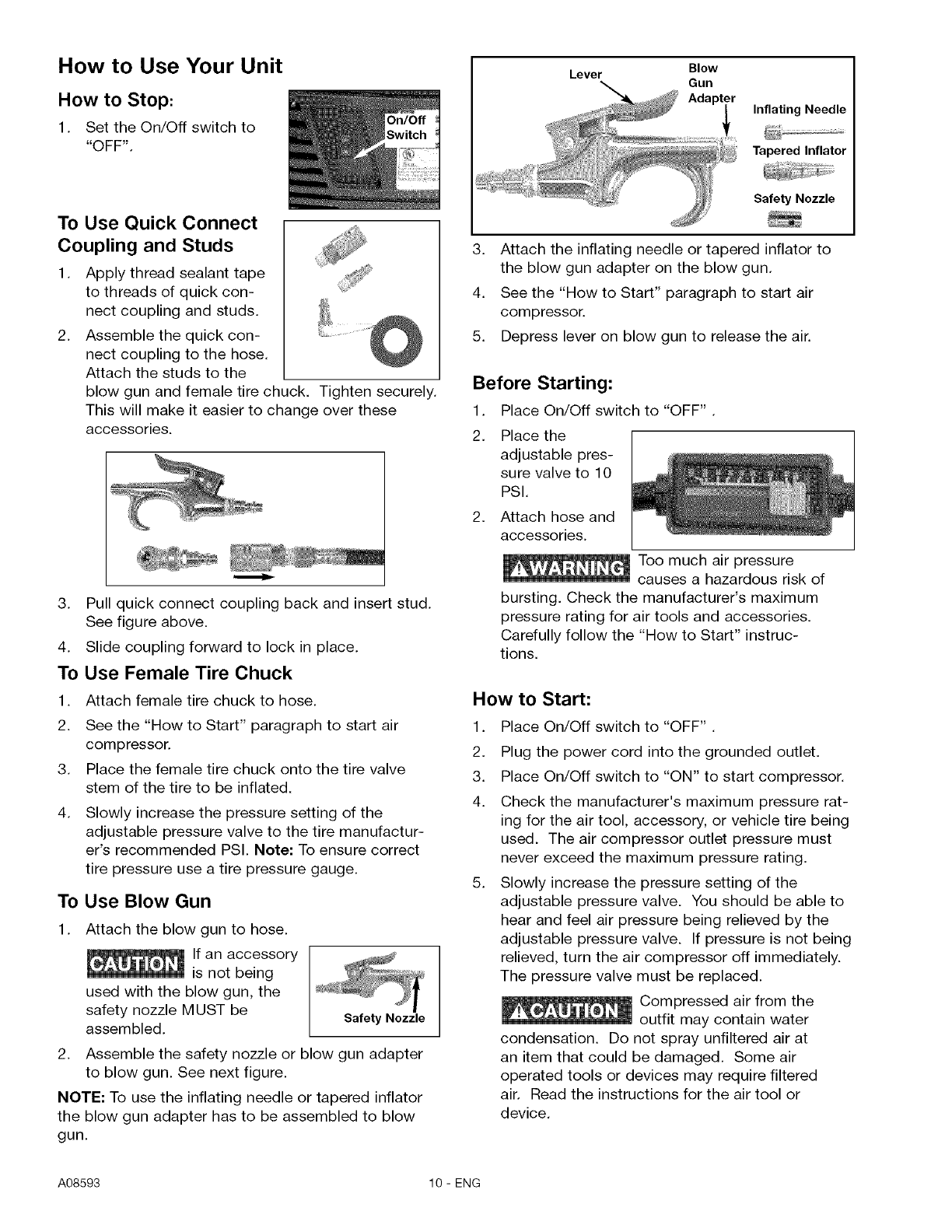
How to Use Your Unit
How to Stop:
1. Set the On/Off switch to
"OFF".
To Use Quick Connect
Coupling and Studs
1. Apply thread sealant tape
to threads of quick con-
nect coupling and studs,
2. Assemble the quick con-
nect coupling to the hose,
Attach the studs to the
blow gun and female tire chuck. Tighten securely,
This will make it easier to change over these
accessories.
3. Pull quick connect coupling back and insert stud.
See figure above,
4. Slide coupling forward to lock in place,
To Use Female Tire Chuck
1. Attach female tire chuck to hose.
2. See the "How to Start" paragraph to start air
compressor.
3. Place the female tire chuck onto the tire valve
stem of the tire to be inflated.
,Slowly increase the pressure setting of the
adjustable pressure valve to the tire manufactur-
er's recommended PSI. Note: To ensure correct
tire pressure use a tire pressure gauge.
To Use Blow Gun
1, Attach the blow gun to hose.
If an accessory
is not being
used with the blow gun, the
safety nozzle MUST be
assembled. Safety Nozzle
2. Assemble the safety nozzle or blow gun adapter
to blow gun. See next figure.
NOTE: To use the inflating needle or tapered inflator
the blow gun adapter has to be assembled to blow
gun.
ILever Blow
Gun
Adapter Inflating Needle
Tapered Inflator
Safety Nozzle
3. Attach the inflating needle or tapered inflator to
the blow gun adapter on the blow gun.
4. See the "How to Start" paragraph to start air
compressor.
5. Depress lever on blow gun to release the air.
Before Starting:
1. Place On/Off switch to "OFF".
2. Place the
adjustable pres-
sure valve to 10
PSI.
2. Attach hose and
accessories.
Too much air pressure
causes a hazardous risk of
bursting. Check the manufacturer's maximum
pressure rating for air tools and accessories.
Carefully follow the "How to Start" instruc-
tions.
How to Start:
1. Place On/Off switch to "OFF".
2.
3.
4.
5,
Plug the power cord into the grounded outlet.
Place On/Off switch to "ON" to start compressor.
Check the manufacturer's maximum pressure rat-
ing for the air tool, accessory, or vehicle tire being
used. The air compressor outlet pressure must
never exceed the maximum pressure rating.
Slowly increase the pressure setting of the
adjustable pressure valve. You should be able to
hear and feel air pressure being relieved by the
adjustable pressure valve. If pressure is not being
relieved, turn the air compressor off immediately.
The pressure valve must be replaced.
Compressed air from the
outfit may contain water
condensation. Do not spray unfiltered air at
an item that could be damaged. Some air
operated tools or devices may require filtered
air. Read the instructions for the air tool or
device.
A08593 10-ENG
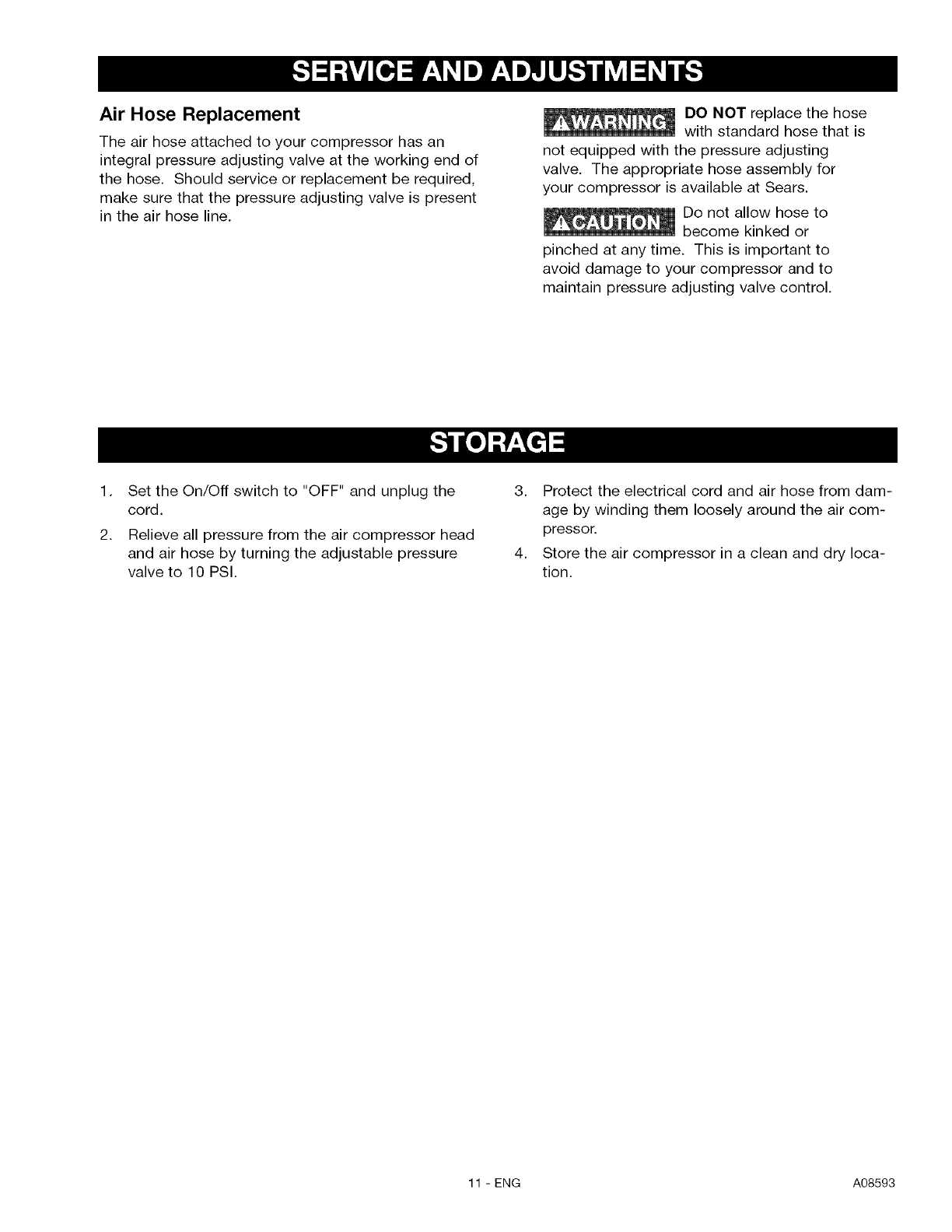
Air Hose Replacement
The air hose attached to your compressor has an
integral pressure adjusting valve at the working end of
the hose. Should service or replacement be required,
make sure that the pressure adjusting valve is present
in the air hose line.
DO NOT replace the hose
with standard hose that is
not equipped with the pressure adjusting
valve. The appropriate hose assembly for
your compressor is available at Sears.
Do not allow hose to
become kinked or
pinched at any time. This is important to
avoid damage to your compressor and to
maintain pressure adjusting valve control.
1.
2.
Set the On/Off switch to "OFF" and unplug the
cord.
Relieve all pressure from the air compressor head
and air hose by turning the adjustable pressure
valve to 10 PSI.
3. Protect the electrical cord and air hose from dam-
age by winding them loosely around the air com-
pressor.
4. Store the air compressor in a clean and dry loca-
tion.
11- ENG A08593
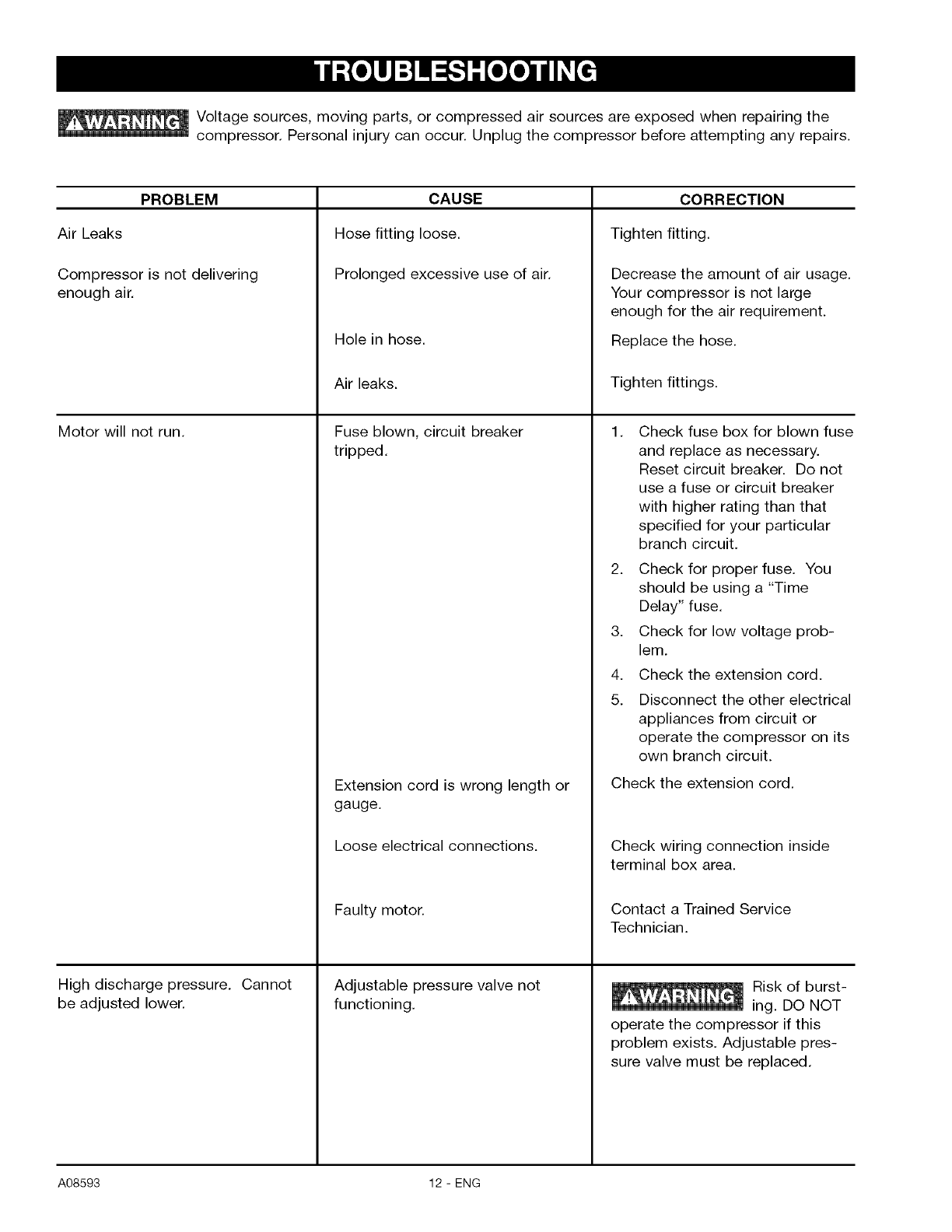
Voltage sources, moving parts, or compressed air sources are exposed when repairing the
compressor. Personal injury can occur. Unplug the compressor before attempting any repairs.
PROBLEM
Air Leaks
Compressor is not delivering
enough air.
Motor will not run.
CAUSE
Hose fitting loose.
Prolonged excessive use of air.
Hole in hose.
Air leaks.
CORRECTION
Tighten fitting.
Decrease the amount of air usage.
Your compressor is not large
enough for the air requirement.
Fuse blown, circuit breaker
tripped.
Extension cord is wrong length or
gauge.
High discharge pressure. Cannot
be adjusted lower.
Loose electrical connections.
Faulty motor.
Adjustable pressure valve not
functioning.
Replace the hose.
Tighten fittings.
1.
2.
3.
4.
5.
Check fuse box for blown fuse
and replace as necessary.
Reset circuit breaker. Do not
use a fuse or circuit breaker
with higher rating than that
specified for your particular
branch circuit.
Check for proper fuse. You
should be using a "Time
Delay" fuse.
Check for low voltage prob-
lem.
Check the extension cord.
Disconnect the other electrical
appliances from circuit or
operate the compressor on its
own branch circuit.
Check the extension cord.
Check wiring connection inside
terminal box area.
Contact a Trained Service
Technician.
Risk of burst-
ing. DO NOT
operate the compressor if this
problem exists. Adjustable pres-
sure valve must be replaced.
A08593 12 - ENG
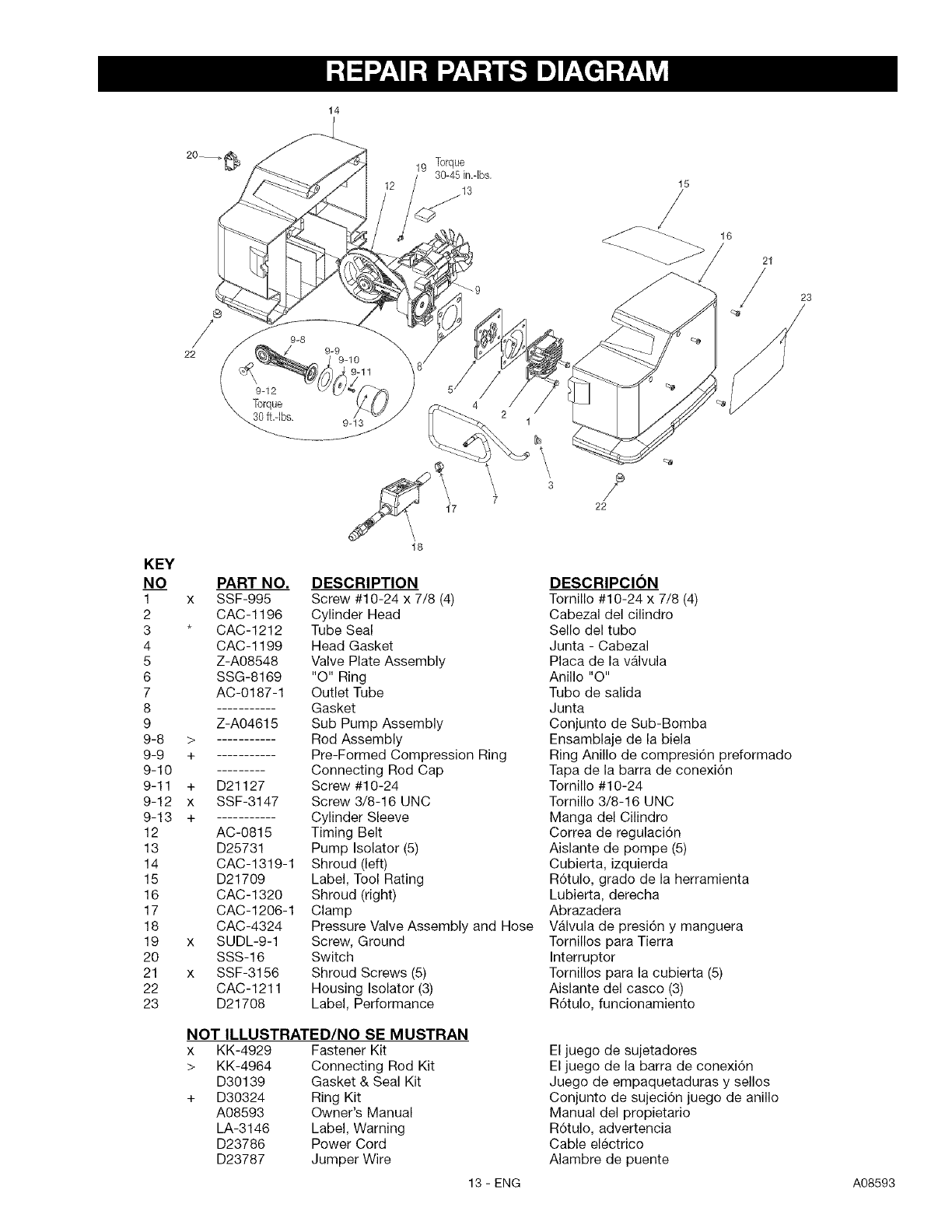
14
19 Torque
30-45 in.-Ibs. 15
/
16
21
/23
22
KEY
NO
1
2
3
4
5
6
7
8
9
9-8
9-9
9-10
9-11
9-12
9-13
12
13
14
15
16
17
18
19
2O
21
22
23
\
18
+
X
+
×
×
3
7
17
PART NO. DESCRIPTION
SSF-995 Screw #10-24 x 718 (4)
CAC-1196 Cylinder Head
CAC-1212 Tube Seal
CAC-1199 Head Gasket
Z-A08548 Valve Plate Assembly
SSG-8169 "O" Ring
AC-0187-1 Outlet Tube
Gasket
Z-A04615 Sub Pump Assembly
Rod Assembly
Pre-Formed Compression Ring
Connecting Rod Cap
D21127 Screw #10-24
SSF-3147 Screw 3/8-16 UNC
Cylinder Sleeve
AC-0815 Timing Belt
D25731 Pump Isolator (5)
CAC-1319-1 Shroud (left)
D21709 Label, Tool Rating
CAC-1320 Shroud (right)
CAC-1206-1 Clamp
CAC-4324 Pressure Valve Assembly and Hose
SUDL-9-1 Screw, Ground
SSS-16 Switch
SSF-3156 Shroud Screws (5)
CAC-1211 Housing Isolator (3)
D21708 Label, Performance
NOT ILLUSTRATED/NO SE MUSTRAN
x KK-4929 Fastener Kit
> KK-4964 Connecting Rod Kit
D30139 Gasket & Seal Kit
+ D30324 Ring Kit
A08593 Owner's Manual
LA-3146 Label, Warning
D23786 Power Cord
D23787 Jumper Wire
22
DESCRIPCION
Tornillo #10-24 x 7/8 (4)
Cabezal del cilindro
Sello del tubo
Junta - Cabezal
Placa de la valvula
Anillo "O"
Tubo de salida
Junta
Conjunto de Sub-Bomba
Ensamblaje de la biela
Ring Anillo de compresidn preformado
Tapa de la barra de conexi6n
Tornillo #10-24
Tornillo 3/8-16 UNC
Manga del Cilindro
Correa de regulaci6n
Aislante de pompe (5)
Cubierta, izquierda
R6tulo, grade de la herramienta
Lubierta, derecha
Abrazadera
Valvula de presidn y manguera
Tornillos para Tierra
Interruptor
Tornillos para la cubierta (5)
Aislante del casco (3)
R6tulo, funcionamiento
El juego de sujetadores
El juego de la barra de conexi6n
Juego de empaquetaduras y sellos
Conjunto de sujeci6n juego de anillo
Manual del propietario
R6tulo, advertencia
Cable electrico
Alambre de puente
13-ENG A08593
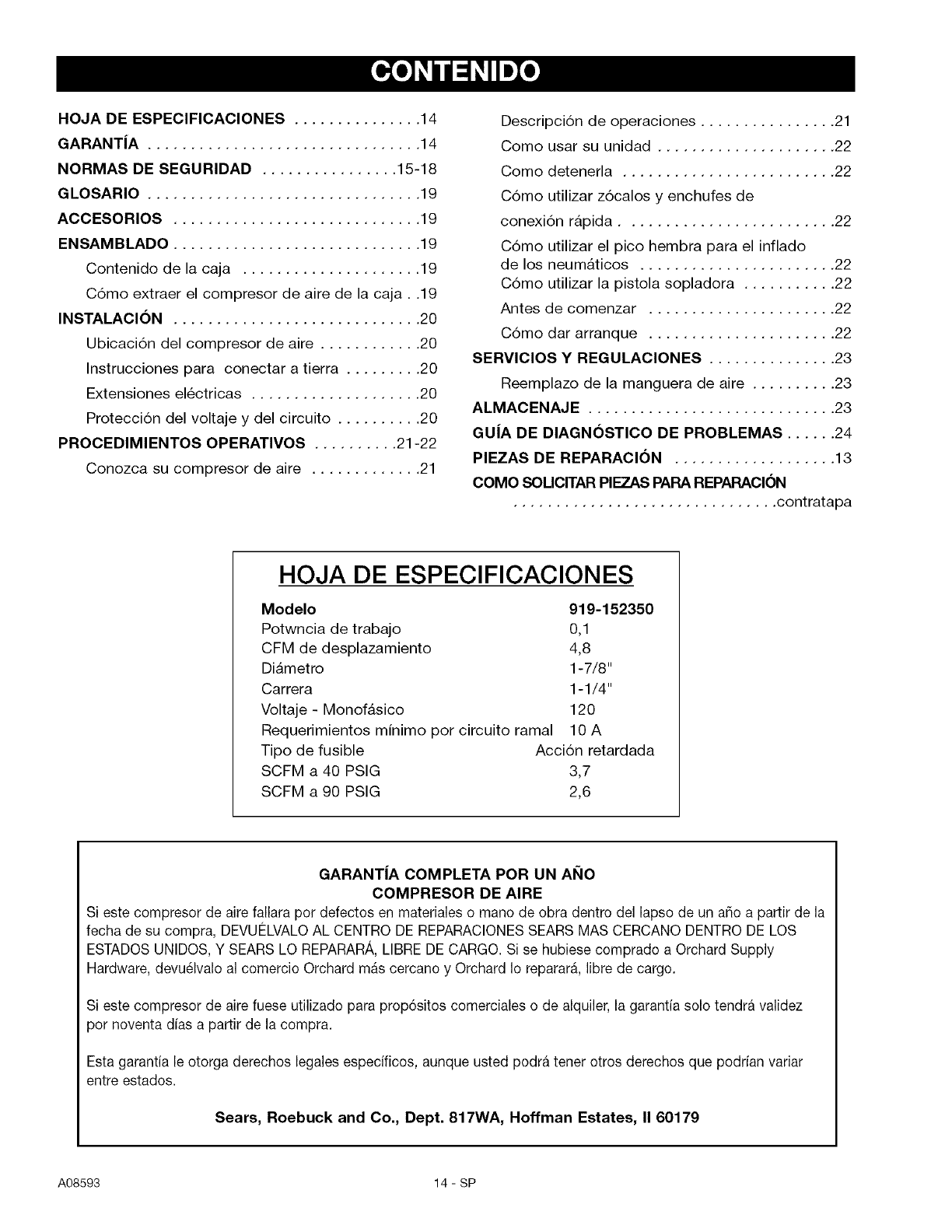
HOJA DE ESPECIFICACIONES ............... 14
GARANTIA ................................ 14
NORMAS DE SEGURIDAD ................ 15-18
GLOSARIO ................................ 19
ACCESORIOS ............................. 19
ENSAMBLADO ............................. 19
Contenido de la caja ..................... 19
C6mo extraer el compresor de aire de la caja..19
INSTALACION ............................. 20
Ubicaci6n del compresor de aire ............ 20
Instrucciones para conectar a tierra ......... 20
Extensiones el@ctricas .................... 20
Protecci6n del voltaje y del circuito .......... 20
PROCEDIMIENTOS OPERATIVOS .......... 21-22
Conozca su compresor de aire ............. 21
Descripci6n de operaciones ................ 21
Come usar su unidad ..................... 22
Come detenerla ......................... 22
C6mo utilizar z6calos y enchufes de
conexi6n r_.pida ......................... 22
C6mo utilizar el pico hembra para el inflado
de los neum6.ticos ....................... 22
C6mo utilizar la pistola sopladora ........... 22
Antes de comenzar ...................... 22
C6mo dar arranque ...................... 22
SERVIClOS Y REGULAClONES ............... 23
Reemplazo de la manguera de aire .......... 23
ALMACENAJE ............................. 23
GUlA DE DIAGNOSTICO DE PROBLEMAS ...... 24
PIEZAS DE REPARACION ................... 13
COMO SOUCITAR PIEZAS PAPA REPARACION
............................... contratapa
HOJA DE ESPECIFICACIONES
Modelo 919-152350
Potwncia de trabajo 0,1
CFM de desplazamiento 4,8
Di_.metro 1-7/8"
Carrera 1-1/4"
Voltaje - Monof_.sico 120
Requerimientos minimo por circuito ramal 10 A
Tipo de fusible Acci6n retardada
SCFM a 40 PSIG 3,7
SCFM a 90 PSIG 2,6
GARANTIA COMPLETA POR UN AI_IO
COMPRESOR DE AIRE
Si este compresor de aire fallara por defectos en materiales o mano de obra dentro del lapso de un aSoa partir de la
fecha de su compra, DEVUC:LVALOAL CENTRO DE REPARACIONESSEARS MAS CERCANO DENTRODE LOS
ESTADOSUNIDOS, Y SEARS LO REPARARA,LIBRE DE CARGO. Si se hubiese comprado a Orchard Supply
Hardware, devu@lvaloal comercio Orchard mas cercano y Orchard Io reparar_.,libre de cargo.
Si este compresor de aire fuese utilizado para propositos comerciales o de alquiler, la garantia solo tendra validez
por noventa dias a partir de la compra.
Esta garantia le otorga derechos legales especificos, aunque usted podr_,tener otros derechos que podrian variar
entre estados.
Sears, Roebuck and Co., Dept. 817WA, Hoffman Estates, II 60179
A08593 14- SP
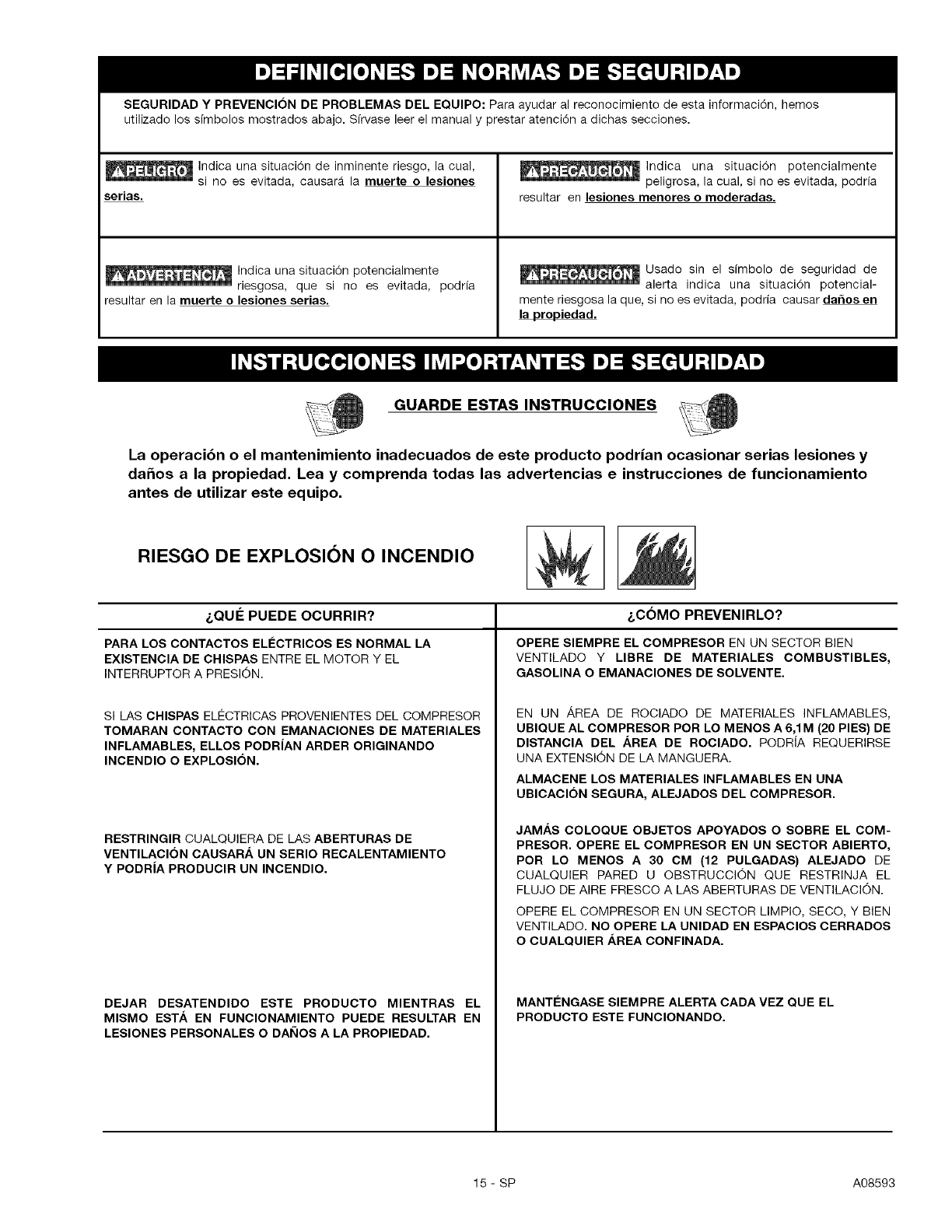
SEGURIDAD Y PREVENCION DE PROBLEMAS DEL EQUIPO: Para ayudar al reconocimiento de esta informaciOn, hemos
utilizado los simbolos mostrados abajo. Sfrvase leer el manual y prestar atenciOn a dichas secciones.
Indica una situaci6n de inminente riesgo, la cual,
si no es evitada, causarA la muerte o lesiones
serias.
Indica una situaciOn potencialmente
riesgosa, que si no es evitada, podria
resultar en la muerte o lesiones serias.
_lndica una situaciOn potencialmente
peligrosa, la cual, si no es evitada, podria
resultar en lesiones menores o moderadas.
Usado sin el simbolo de seguridad de
alerta indica una situaci6n potencial-
mente riesgosa la que, si no es evitada, podria causar dafios en
la propiedad.
GUARDE ESTAS INSTRUCClONES
La operacibn o el mantenimiento inadecuados de este producto podrian ocasionar serias lesiones y
dafios a la propiedad. Lea y comprenda todas las advertencias e instrucciones de funcionamiento
antes de utilizar este equipo.
RIESGO DE EXPLOSION O INCENDIO
&QUI_ PUEDE OCURRIR?
PARA LOS CONTACTOS ELI_CTRICOS ES NORMAL LA
EXISTENCIA DE CHISPAS ENTRE EL MOTOR Y EL
INTERRUPTOR A PRESION.
SI LAS CHISPAS EL¢CTRICAS PROVENIENTES DEL COMPRESOR
TOMARAN CONTACTO CON EMANACIONES DE MATERIALES
INFLAMABLES, ELLOS PODRIAN ARDER ORIGINANDO
INCENDIO O EXPLOSION.
RESTRINGIR CUALQUIERA DE LAS ABERTURAS DE
VENTILAClON CAUSARA UN SERIO RECALENTAMIENTO
Y PODRIA PRODUCIR UN INCENDIO.
DEJAR DESATENDIDO ESTE PRODUCTO MIENTRAS EL
MISMO EST,&. EN FUNCIONAMIENTO PUEDE RESULTAR EN
LESlONES PERSONALES O DAI_IOS A LA PROPIEDAD.
_,C6MO PREVENIRLO?
OPERE SIEMPRE EL COMPRESOR EN UN SECTOR BIEN
VENTILADO Y LIBRE DE MATERIALES COMBUSTIBLES,
GASOLINA O EMANAClONES DE SOLVENTE.
EN UN AREA DE ROCIADO DE MATERIALES INFLAMABLES,
UBIQUE AL COMPRESOR POR LO MENOS A 6,1M (20 PIES) DE
DISTANCIA DEL h.REA DE ROCIADO. PODRiA REQUERIRSE
UNA EXTENSION DE LA MANGUERA.
ALMACENE LOS MATERIALES INFLAMABLES EN UNA
UBICACION SEGURA, ALEJADOS DEL COMPRESOR.
JAMAS COLOQUE OBJETOS APOYADOS O SOBRE EL COM-
PRESOR. OPERE EL COMPRESOR EN UN SECTOR ABIERTO,
POR LO MENOS A 30 CM (12 PULGADAS) ALEJADO DE
CUALQUIER PARED U OBSTRUCCION QUE RESTRINJA EL
FLUJO DE AIRE FRESCO A LAS ABERTURAS DE VENTILACION.
OPERE EL COMPRESOR EN UN SECTOR LIMPIO, SECO, Y BIEN
VENTILADO. NO OPERE LA UNIDAD EN ESPACIOS CERRADOS
O CUALQUlER ,&,REA CONFINADA.
MANTleNGASE SlEMPRE ALERTA CADA VEZ QUE EL
PRODUCTO ESTE FUNCIONANDO.
15- SP A08593
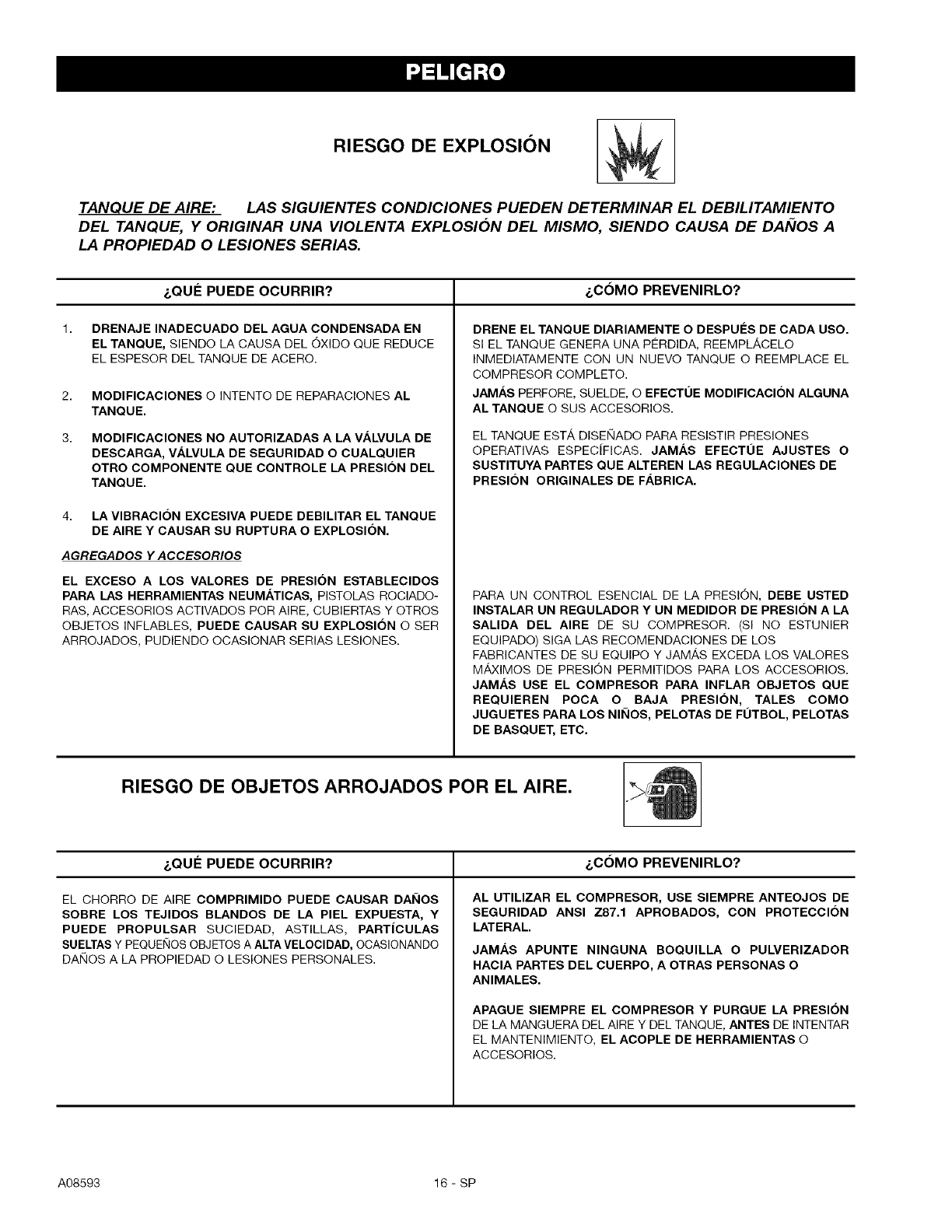
RIESGO DE EXPLOSION
TANQUE DE AIRE: LAS SIGUIENTES CONDICIONES PUEDEN DETERMINAR EL DEBILITAMIENTO
DEL TANQUE, Y ORIGINAR UNA VIOLENTA EXPLOSION DEL MISMO, SIENDO CAUSA DE DAhlOS A
LA PROPIEDAD 0 LESIONES SERIAS.
2.
3.
_,QU¢: PUEDE OCURRIR? &C6MO PREVENIRLO?
DRENAJE INADECUADO DEL AGUA CONDENSADA EN
EL TANQUE, SIENDO LA CAUSA DEL OXIDO QUE REDUCE
EL ESPESOR DEL TANQUE DE ACERO.
MODIFICACIONES O INTENTO DE REPARACIONES AL
TANQUE.
MODIFICACIONES NO AUTORIZADAS A LA VALVULA DE
DESCARGA, VALVULA DE SEGURIDAD 0CUALQUIER
OTRO COMPONENTE QUE CONTROLE LA PRESION DEL
TANQUE.
LA VIBRACION EXCESIVA PUEDE DEBILITAR EL TANQUE
DE AIRE Y CAUSAR SU RUPTURA O EXPLOSION.
AGREGADOS Y ACCESORIOS
EL EXCESO A LOS VALORES DE PRESION ESTABLECIDOS
PARA I.AS HERRAMIENTAS NEUMATICAS, PISTOLAS ROGIADO-
RAS, ACCESORIOS ACTIVADOS POR AIRE, CUBIERTAS Y OTROS
OBJETOS INFLABLES, PUEDE CAUSAR SU EXPLOSION O SER
ARROJADOS, PUDIENDO OCASIONAR SERIAS LESIONES.
DRENE EL TANQUE DIARIAMENTE ODESPUI_S DE CADA USO.
Sl EL TANQUE GENERA UNA PCRDIDA, REEMPLikCELO
INMEDIATAMENTE CON UN NUEVO TANQUE O REEMPLACE EL
COMPRESOR COMPLETO.
JAMAS PERFORE, SUELDE, O EFECTUE MODIFICACION ALGUNA
AL TANOUE O SUS ACCESORIOS.
EL TANQUE ESTik DISENADO PARA RESISTIR PRESIONES
OPERATIVAS ESPECiFICAS. JAMAS EFECTUE AJUSTES O
SUSTITUYA PARTES QUE ALTEREN LAS REGULACIONES DE
PRESION ORIGINALES DE FABRICA.
PARA UN CONTROL ESENCIAL DE LA PRESION, DEBE USTED
INSTALAR UN REGULADOR Y UN MEDIDOR DE PRESlON A LA
SALIDA DEL AIRE DE SU COMPRESOR. (Sl NO ESTUNIER
EQUIPADO) SIGA LAS RECOMENDACIONES DE LOS
FABRICANTES DE SU EQUIPO Y JAMAS EXCEDA LOS VALORES
M/kXIMOS DE PRESION PERMITIDOS PARA LOS ACCESORIOS.
JAMAS USE EL COMPRESOR PARA INFLAR OBJETOS QUE
REOUIEREN POOA O BAJA PRESlON, TALES COMO
JUGUETES PARA LOS NII_IOS, PELOTAS DE FUTBOL, PELOTAS
DE BASQUET, ETC.
RIESGO DE OBJETOS ARROJADOS POR EL AIRE.
_,QU¢: PUEDE OCURRIR?
EL CHORRO DE AIRE COMPRIMIDO PUEDE CAUSAR DAI_IOS
SOBRE LOS TEJIDOS BLANDOS DE LA PIEL EXPUESTA, Y
PUEDE PROPULSAR SUCIEDAD, ASTILLAS, PARTICULAS
SUELTAS Y PEQUE_IOSOBJETOS A ALTA VELOClDAD, OCASIONANDO
DANOS A LA PROPIEDAD O LESIONES PERSONALES.
&C6MO PREVENIRLO?
AL UTILIZAR EL COMPRESOR, USE SIEMPRE ANTEOJOS DE
SEGURIDAD ANSI Z87.1 APROBADOS, CON PROTEOCION
LATERAL.
JAMAS APUNTE NINGUNA BOQUlLLA O PULVERIZADOR
HAOIA PARTES DEL CUERPO, A OTRAS PERSONAS O
ANIMALES.
APAGUE SIEMPRE EL COMPRESOR Y PURGUE LA PRESION
DE LA MANGUERA DEL AIRE Y DEL TANQUE, ANTES DE INTENTAR
EL MANTENIMIENTO, EL ACOPLE DE HERRAMIENTAS O
ACCESORIOS.
A08593 16- SP

RIESGO DE DESCARGA ELI=CTRICA
_QUEPUEDE OCURRIR?
SU COMPRESOR DE AIRE ESTA ACCIONADO POR ELECTRICIDAD.
COMO CUALQUIER OTRO DISPOSITIVO ELECTRICO IMPULSADO
EL¢CTRICAMENTE, Sl NO SE LO UTILIZA ADECUADAMENTE,
PODRiA CAUSARLE UNA DESCARGA ELleCTRICA.
LAS REPARAClONES INTENTADAS POR PERSONAL NO
CALIFICADO PODRIAN OCASlONAR SERIAS LESlONES O LA
MUERTE POR ELECTROCUCION.
CONEXION A TIERRA: DEJAR DE PROVEER UNA ADECUADA
CONEXlON A TIERRA A ESTE PRODUCTO PODRiA OCASlONAR
LESlONES SERIAS O LA MUERTE POR ELECTROCUCION. VER
INSTRUCCIONES PARA LA PUESTA A TIERRA.
_C6MO PREVENIRLO?
JAMAS OPERE EL COMPRESOR A LA INTEMPERIE CUANDO
ESTA LLOVlENDO O EN CONDICIONES DE HUMEDAD.
NUNCA OPERE EL COMPRESOR SIN SUS DEFENSAS O SUS
CUBIERTAS REMOVIDAS O DAI_IADAS.
CUALQUIER CONEXlON ELleCTRICA O REPARACION
REQUERIDA POR ESTE PRODUCTO DEBE SER EFECTUADA
POR PERSONAL AUTORIZADO DE LOS SERVICENTROS DE
ACUERDO A LOS CODIGOS ELECTRICOS NACIONALES Y
LOCALES.
ASEGURESE QUE EL CIRCUITO ELleCTRICO AL CUAL ESTA
CONECTADO EL COMPRESOR, SUMINISTRA APROPIADA
CONEXlON A TIERRA, TENSION CORRECTA Y UNA ADECUADA
PROTECCION DE FUSlBLES.
RIESGO DE INHALACION
&QU¢: PUEDE OCURRIR? _,COMO PREVENIRLO?
EL AIRE COMPRIMIDO PROVENIENTE DEL COMPRESOR NO
ES SANO PARA RESPIRAR. EL CHORRO DE AIRE PUEDE
CONTENER MONOXlDO DE CARBONO, VAPORES T(_XlCOS O
PART[CULAS SOLIDAS PROVENIENTES DEL TANQUE. LA
INHALACION DE DICHOS CONTAMINANTES PUEDE LLEGAR A
CAUSAR SERIAS LESlONES O LA MUERTE.
EL ROCIADO DE MATERIALES TALES COMO PINTURA,
SOLVENTES, REMOVEDORES DE PINTURA, INSECTICIDAS, MATA
HIERBAS, CONTIENEN EMANACIONES DAi_INAS Y VENENOSAS.
EL AIRE OBTENIDO DIRECTAMENTE DEL COMPRESOR JAMAS
DEBERA SER UTILIZADO PARA PROVEER AIRE PARA CONSUMO
HUMANO. PARA PODER UTILIZAR EL AIRE PRODUCIDO POR
ESTE COMPRESOR Y HACERLO RESPIRABLE, DEBERAN
INSTALARSE UN FILTRO ADECUADO Y UN EQUlPO DE
SEGURIDAD INTERCALADO. LOS FILTROS INTERCALADOS
TANTO COMO EL EQUIPO DE SEGURIDAD UTILIZADO EN
CON JUNTO CON EL COMPRESOR, DEBERAN SER CAPACES
DE PROCESAR EL TRATAMIENTO DEL AIRE DE ACUERDO A
TODOS LOS CODIGOS LOCALES Y FEDERALES, PREVIO AL
CONSUMO HUMANO.
TRABAJE EN UN .&.REA CON BUENA VENTILACION CRUZADA.
LEA YSIGA LAS INSTRUCCIONES DE SEGURIDAD PROVISTAS
EN EL ROTULO O EN LOS DATOS DE LAS HOJAS DE SEGURIDAD
DEL MATERIAL QUE EST.&.PULVERIZANDO. USE EL RESPIRADOR
APROBADO NIOSH/MSHA DESIGNADO PARA UTILIZARSE CON
SU APLICACION ESPEC[FICA.
17 - SP A08593
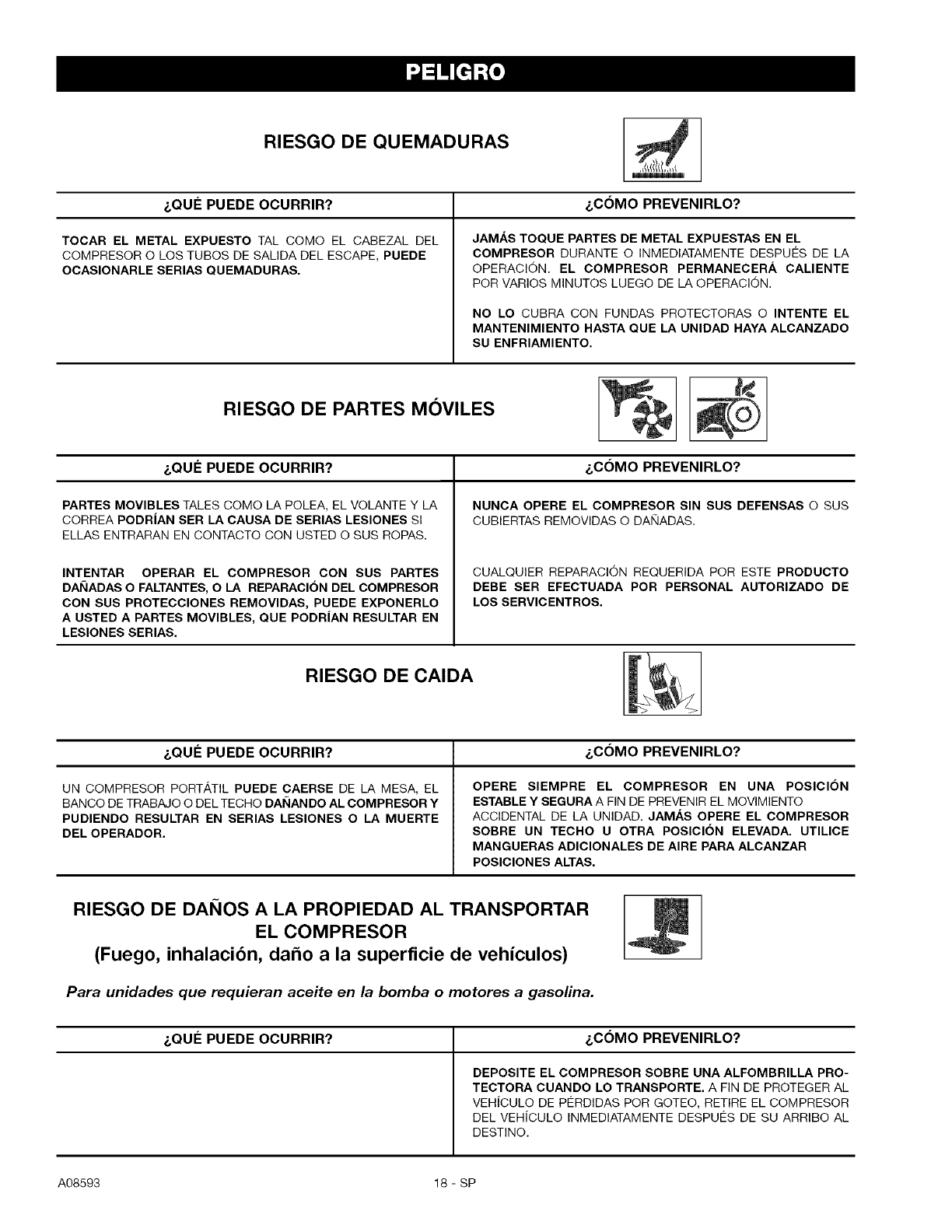
RIESGO DE QUEMADURAS
_,QU¢: PUEDE OCURRIR?
TOCAR EL METAL EXPUESTO TAL COM© EL CABEZAL DEL
COMPRESOR O LOS TUBOS DE SALIDA DEL ESCAPE, PUEDE
OOASlONARLE SERIAS QUEMADURAS.
&COMO PREVENIRLO?
JAMAS TOQUE PARTES DE METAL EXPUESTAS EN EL
COMPRESOR DURANTE O INMEDIATAMENTE DESPUt_S DE LA
OPERACION. EL OOMPRESOR PERMANECERA CALIENTE
POR VARIOS MINUTOS LUEGO DE LA OPERACION.
NO LO CUBRA CON FUNDAS PROTECTORAS O INTENTE EL
MANTENIMIENTO HASTA QUE LA UNIDAD HAYA ALCANZADO
SU ENFRIAMIENTO.
RIESGO DE PARTES MOVILES
_,QU¢: PUEDE OCURRIR? &COMO PREVENIRLO?
PARTES MOVIBLES TALES COMO LA POLEA, EL VOLANTE Y LA
CORREA PODRIAN SER LA CAUSA DE SERIAS LESlONES Sl
ELLAS ENTRARAN EN CONTACTO CON USTED O SUS ROPAS.
INTENTAR OPERAR EL COMPRESOR CON SUS PARTES
DAI_IADAS OFALTANTES, O LA REPARACION DEL COMPRESOR
CON SUS PROTECCIONES REMOVIDAS, PUEDE EXPONERLO
A USTED APARTES MOVIBLES, QUE PODRIAN RESULTAR EN
LESIONES SERIAS,
NUNCA OPERE EL COMPRESOR SIN SUS DEFENSAS O SUS
CUBIERTAS REMOVIDAS O DANADAS.
CUALQUIER REPARACION REQUERIDA POR ESTE PRODUCTO
DEBE SER EFEOTUADA POR PERSONAL AUTORIZADO DE
LOS SERVICENTROS.
RIESGO DE CAIDA
_,QU¢: PUEDE OCURRIR? &COMO PREVENIRLO?
UN COMPRESOR PORTATIL PUEDE CAERSE DE LA MESA, EL
BANCO DE TRABAJO O DEL TECHO DAI_IANDO AL OOMPRESOR Y
PUDIENDO RESULTAR EN SERIAS LESlONES O LA MUERTE
DEL OPERADOR.
OPERE SlEMPRE EL COMPRESOR EN UNA POSlClON
ESTABLE Y SEGURA A FIN DE PREVENIR EL MOVIMIENTO
ACCIDENTAL DE LA UNIDAD. JAMAS OPERE EL COMPRESOR
SOBRE UN TECHO U OTRA POSlCION ELEVADA. UTILICE
MANGUERAS ADIClONALES DE AIRE PARA ALCANZAR
POSlOIONES ALTAS.
RIESGO DE DAI_IOS A LA PROPIEDAD AL TRANSPORTAR
EL COMPRESOR
(Fuego, inhalacion, daho a la superficie de vehiculos}
Para unidades que requieran aceite en la bomba o motores agasolina.
_,QU¢: PUEDE OCURRIR? &COMO PREVENIRLO?
DEPOSITE EL COMPRESOR SOBRE UNA ALFOMBRILLA PRO-
TECTORA CUANDO LO TRANSPORTE. A FIN DE PROTEGER AL
VEHfCULO DE Pt_RDIDAS POR GOTEO, RETIRE EL COMPRESOR
DEL VEHICULO INMEDIATAMENTE DESPUES DE SU ARRIBO AL
DESTINO.
A08593 18- SP

Familiaricese con los siguientes t6rminos, antes de operar la
unidad:
Cfm: (Cubic feet per minute) Pies ct_bicos por minuto.
SCFM: (Stardardcubic feetper minute)Pies ct_bicosestandar
por minuto; unaunidadde medida quepermitemedir la canti-
dad de entregade aire.
PSlG: (Poundpersquareinch)Ubrasper pulgadacuadrada.
C6digo de certificaci6n: Los productos que usan una o
mas de las siguientes marcas: UL, CUL, ETL, CETL, han
sido evaluados pot OSHA, laboratorios independientes cer-
tificados en seguridad, y reOnenlos est_.ndaressuscriptos
por los laboratories dedicados a la certificaci6n de la
seguridad.
Ramal: Circuito el6ctrico que transporta electricidad desde
el panel de control hasta el tomacorriente.
Esta unidad es suficiente para abastecer de energia el6ctrica a los siguientes accesorios. Estos se encuentran disponibles a
traves del catalogo para herramientas el_ctricas y manuales, en cualquiera de los comercios que mantiene la linea completa
de SEARS.
Accesorios Herramientas para carpinteria
Juegos de conexi6n r_.pida (varias medidas) M_.quina clavadora /abrochadora
Herramientas pot especialidades
Cepillo neum_tico
Pistola infladora /sopladora
Pistola engrasadora
Pistola para aplicaci6n de sellador
Contenido de la caja de embalaje
1. Compresor de aire con manguera y v_.lvulareguladora
de presi6n (cant. 1)
2. Receptaculo para conexi6n ra.pida(Cant. 1)
3. Enchufe para conexi6n r_pida (Cant. 2)
4. Cinta selladora para rosca (Cant. 1)
5. Pico hembrapara Ilenadode airea los neumaticos(Cant.1)
6. Pistola sopladora (Cant. 1)
7. Boquilla de seguridad (Cant 1)
8. Adaptador para pistola sopladora (Cant. 1)
9. Aguja parainflado (Cant.l)
10. Inflador roscado (Cant. 1)
Para extraer el compresor de aire de su caja
1. Suj6telo de la manija y lev_.ntelo fuera de su caja.
2. Extraiga y descarte todo el embalaje del compre-
sor de aire.
10
19- SP A08593
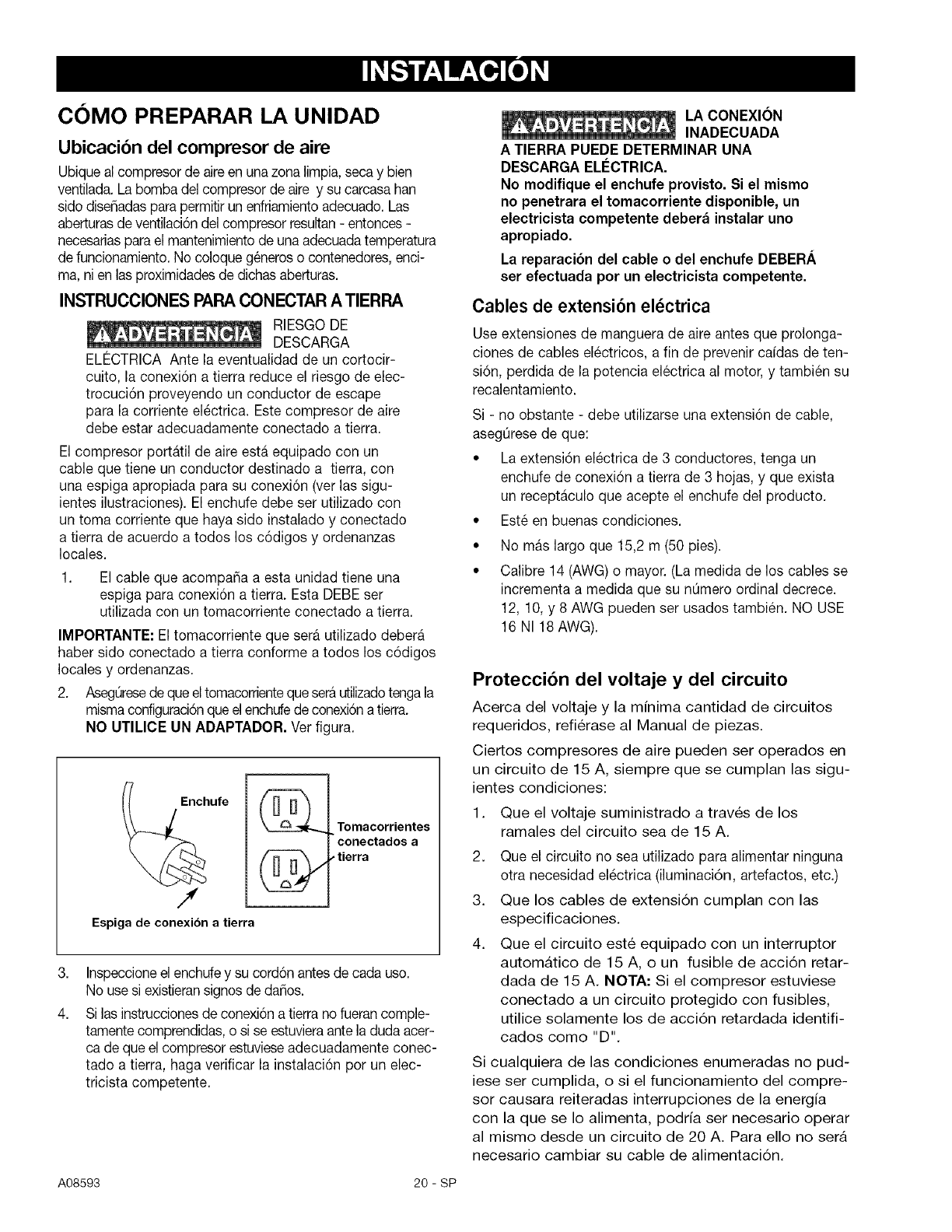
COMO PREPARAR LA UNIDAD
Ubicacion del compresor de aire
Ubique alcompresorde aireen unazona limpia,secay bien
ventilada.La bomba del compresorde aire y su carcasahan
sido dise_adasparapermitirun enfriamientoadecuado.Las
aberturasdeventilaci6ndel compresorresultan- entonces-
necesariasparaelmantenimientode unaadecuadatemperatura
defuncionamiento.No coloque g6neroso contenedores,enci-
ma, nien las proximidadesde dichasaberturas.
INSTRUCCIONES PAPACONECTAR A TIERRA
RIESGO DE
DESCARGA
ELECTRICA Ante la eventualidad de un cortocir-
cuito, la conexi6n a tierra reduce el riesgo de elec-
trocuci6n proveyendo un conductor de escape
para la corriente el_ctrica. Este compresor de aire
debe estar adecuadamente conectado a tierra.
El compresor portatil de aire esta equipado con un
cable que tiene un conductor destinado a tierra, con
una espiga apropiada para su conexi6n (ver las sigu-
ientes ilustraciones). El enchufe debe ser utilizado con
un toma corriente que haya sido instalado y conectado
a tierra de acuerdo a todos los c6digos y ordenanzas
locales.
1. El cable que acompa_a a esta unidad tiene una
espiga para conexi6n a tierra. Esta DEBE ser
utilizada con un tomacorriente conectado a tierra.
IMPORTANTE: El tomacorriente que ser_.utilizado debera
haber sido conectado a tierra conforme a todos los c6digos
locales y ordenanzas.
2. AsegQresede queeltomacorrientequeserautilizadotengala
mismaconfiguraci6nqueelenchufede conexi6na tierra.
NO UTILICE UN ADAPTADOR.Ver figura.
_hufe
/
Espiga de conexi6n a tierra
Tomacorrientes
"conectados a
•tierra
3.
4.
Inspeccioneelenchufey su cord6n antesde cada uso.
No usesi existieransignos deda_os.
Si las instruccionesde conexi6na tierra nofuerancomple-
tamentecomprendidas,o si se estuvieraantela duda acer-
ca de que el compresorestuvieseadecuadamente conec-
tado a tierra, haga verificar la instalaci6n por un elec-
tricista competente.
LA CONEXION
INADECUADA
A TIERRA PUEDE DETERMINAR UNA
DESCARGA ELI_CTRICA.
No modifique el enchufe provisto. Si el mismo
no penetrara el tomacorriente disponible, un
electricista competente deberb instalar uno
apropiado.
La reparacibn del cable o del enchufe DEBERA
ser efectuada por un electricista competente.
Cables de extensi6n el_ctrica
Use extensiones de manguera de aire antes que prolonga-
ciones de cables electricos, a fin de prevenir cddas de ten-
si6n, perdida de la potencia eDctrica al motor, y tambi6n su
recalentamiento.
Si - no obstante - debe utilizarse una extensi6n de cable,
asegQresede que:
• La extensi6n electrica de 3 conductores, tenga un
enchufe de conexi6n a tierra de 3 hojas, y que exista
un receptaculo que acepte el enchufe del producto.
• Est6 en buenas condiciones.
No m_.slargo que 15,2 m (50 pies).
Calibre 14 (AWG)o mayor. (La medida de los cables se
incrementa a medida que su nQmeroordinal decrece.
12, 10, y 8 AWG pueden ser usados tambien. NO USE
16 N118 AWG).
Proteccion del voltaje y del circuito
Acerca del voltaje y la minima cantidad de circuitos
requeridos, refi6rase al Manual de piezas.
Ciertos compresores de aire pueden ser operados en
un circuito de 15 A, siempre que se cumplan las sigu-
ientes condiciones:
1. Que el voltaje suministrado a trav6s de los
ramales del circuito sea de 15 A.
2. Que el circuito no sea utilizado para alimentar ninguna
otra necesidad el6ctrica (iluminaci6n, artefactos, etc.)
3. Que los cables de extensi6n cumplan con las
especificaciones.
4. Que el circuito est6 equipado con un interrupter
autom_.tico de 15 A, o un fusible de acci6n retar-
dada de 15 A. NOTA: Si el compresor estuviese
conectado a un circuito protegido con fusibles,
utilice solamente los de acci6n retardada identifi-
cados come "U".
Si cualquiera de las condiciones enumeradas no pud-
iese ser cumplida, o si el funcionamiento del compre-
sor causara reiteradas interrupciones de la energia
con la que se Io alimenta, podria ser necesario operar
al mismo desde un circuito de 20 A. Para ello no ser_.
necesario cambiar su cable de alimentaci6n.
A08593 20- SP
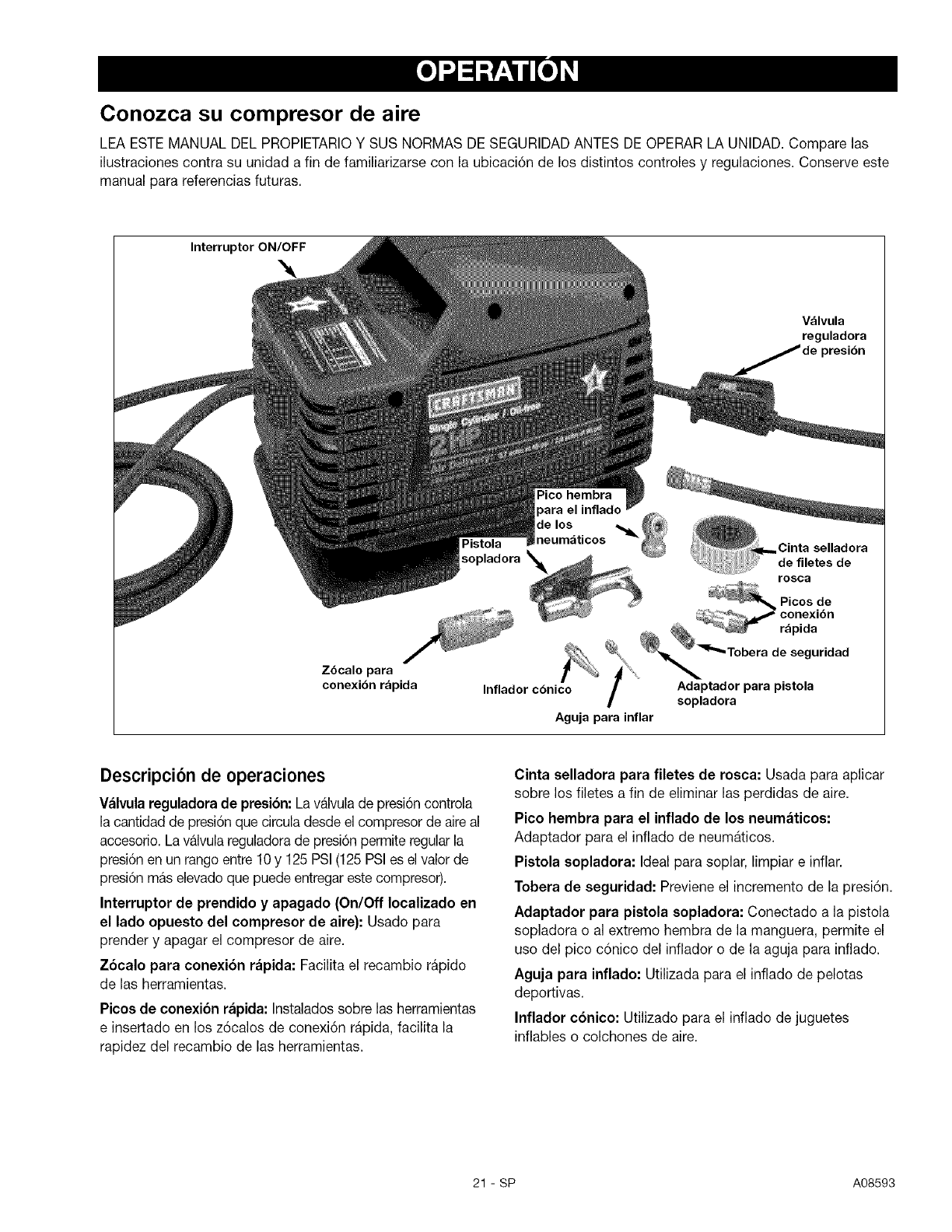
Conozca su compresor de aire
LEA ESTE MANUAL DEL PROPIETARIOY SUS NORMAS DE SEGURIDADANTES DE OPERARLA UNIDAD. Compare las
ilustraciones contra su unidad a fin de familiarizarse con la ubicaci6n de los distintos controles y regulaciones. Conserve este
manual para referencias futuras.
Interruptor ON/OFF
Valvula
reguladora
presibn
Pico hembra
para el inflado
de los ,,_
neumaticos
rosca
Picos de
_::!¢_;°;:_; conex 6n
_ " "
ra ,o
_ ...._.,_,,,_ .
X, Tobera de segundad
Zbcalo para _ _/_ Adaptador para pistola
conexi6n rapida Inflador c6nico
/sopladora
Aguja para inflar
Descripci6n de operaciones
V&lvula reguladora de presibn: Lavalvulade presi6ncontrola
la cantidadde presi6n que circuladesde el compresorde aireal
accesorio.Lavalvulareguladorade presi6npermite regularla
presi6nen un tango entre 10y 125 PSI(125 PSIes el valor de
presi6n maselevadoque puede entregarestecompresor).
Interruptor de prendido y apagado (On/Off Iocalizado en
el lado opuesto del compresor de aire): Usado para
prender y apagar el compresor de aire.
Zbcalo para conexibn r_pida: Facilita el recambio r@ido
de las herramientas.
Picos de conexibn r&pida: Instaladossobre las herramientas
e insertado en los z6calos de conexi6n r@ida, facilita la
rapidez del recambio de las herramientas.
Cinta selladora para filetes de rosca: Usada para aplicar
sobre los filetes a fin de eliminar las perdidas de aire.
Pico hembra para el inflado de los neum_ticos:
Adaptador para el inflado de neumaticos.
Pistola sopladora: Ideal para soplar, limpiar e inflar.
Tobera de seguridad: Previene el incremento de la presi6n.
Adaptador para pistola sopladora: Conectado a la pistola
sopladora o al extremo hembra de la manguera, permite el
uso del pico c6nico del inflador o de la aguja para inflado.
Aguja para inflado: Utilizada para el inflado de pelotas
deportivas.
Inflador cbnico: Utilizado para el inflado de juguetes
inflableso colchones de aire.
21 - SP A08593
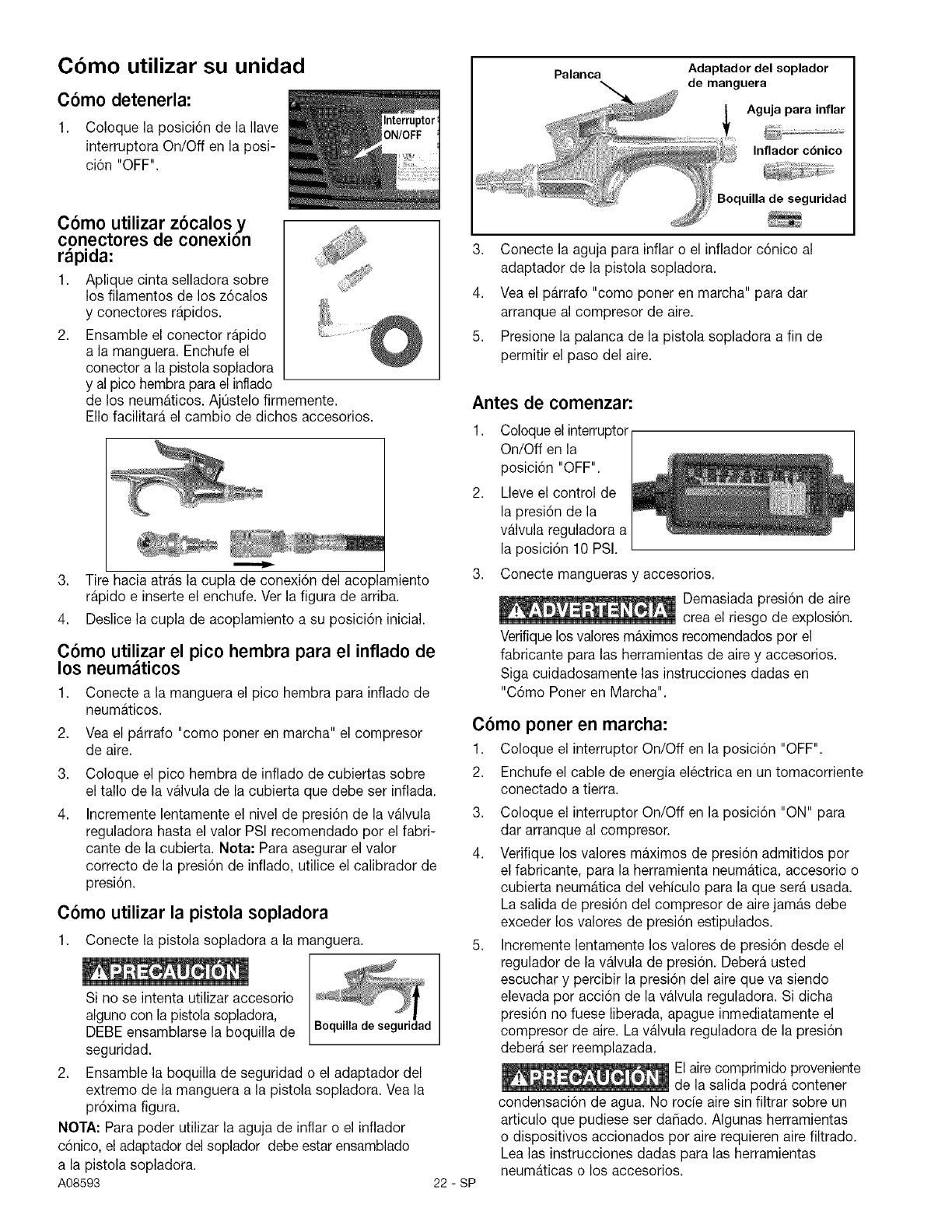
COmo utilizar su unidad [Palanca Adaptador del soplador
Ide manguera
Cbmo detenerla:
1. Coloque la posici6n de la Ilave
interruptora On/Off en la posi-
ci6n "OFF".
COme utilizar zOcalos,y
conectores de conexmn
rdpida:
1. Aplique cinta selladora sobre
los filamentos de los z6calos
y conectores rapidos.
2. Ensamble el conector rapido
a la manguera. Enchufe el
conector a la pistola sopladora
y al pico hembra parael inflado
de los neumaticos. AjOstelofirmemente.
EIIofacilitara el cambio de dichos accesorios.
3. Tire hacia atras la cupla de conexi6n del acoplamiento
r_.pidoe inserte el enchufe. Ver la figura de arriba.
4. Deslice la cupla de acoplamiento a su posicion inicial.
Cbmo utilizar el pico hembra para el inflado de
los neumdticos
1. Conecte a la manguera el pico hembra para inflado de
neumaticos.
2.
3.
4.
Veael parrafo "come poner en marcha" el compresor
de aire.
Coloque el pico hembra de inflado de cubiertas sobre
el tallo de la valvula de la cubierta que debe ser infiada.
Incremente lentamente el nivel de presi6n de la valvula
reguladora hasta el valor PSI recomendado por el fabri-
cante de la cubierta. Nota: Para asegurar el valor
correcto de la presi6n de inflado, utilice el calibrador de
presi6n.
Cbmo utilizar la pistola sopladora
1. Conecte la pistola sopladora a la manguera.
Si no se intenta utilizar accesorio
algunocon la pistolasopladora,
DEBE ensamblarse la boquilla de Boquillade seguridad
seguridad.
2. Ensamble la boquilla de seguridad o el adaptador del
extremo de la manguera a la pistola sopladora. Vea la
pr6xima figura.
NOTA" Para poder utilizar la aguja de inflar o el inflador
cSnico,el adaptador del soplador debe estarensamblado
a la pistola sopladora.
A08593
Aguja para inflar
Inflador cbnico
Boquilla de seguridad
3. Conecte la aguja para inflar o el inflador c6nico al
adaptador de la pistola sopladora.
4. Vea el parrafo "come poner en marcha" para dar
arranque al compresor de aire.
5. Presione la palanca de la pistola sopladora a fin de
permitir el paso del aire.
22 - SP
Antes de comenzar:
2.
3.
Coloqueel interruptor
On/Off en la
posici6n "OFF".
Lleve el control de
la presi6n de la
va.lvulareguladora a
la posici6n 10 PSI.
Conecte mangueras y accesorios.
Demasiada presi6n de aire
crea el riesgo de explosi6n.
Verifiquelos valoresmaximos recomendados por el
fabricante para las herramientas de aire y accesorios.
Siga cuidadosamente las instrucciones dadas en
"C6mo Poner en Marcha".
Cbmo poner en marcha:
I. Coloque el interruptor On/Off en la posici6n "OFF".
2. Enchufe el cable de energia el6ctrica en un tomacorriente
conectado a tierra.
3.
4.
5.
Coloque el interruptor On/Off en la posici6n "ON" para
dar arranque al compresor.
Verifique los valores ma.ximosde presi6n admitidos por
el fabricante, para la herramienta neumatica, accesorio o
cubierta neumatica del vehiculo para la que sera usada.
La salida de presi6n del compresor de aire jamas debe
exceder los valores de presi6n estipulados.
Incremente lentamente los valores de presi6n desde el
regulador de la valvula de presi6n. Debera usted
escuchar y percibir la presi6n del aire que va siendo
elevada por acci6n de la valvula reguladora. Si dicha
presi6n no fuese liberada, apague inmediatamente el
compresor de aire. La va.lvulareguladora de la presi6n
debera ser reemplazada.
Elaire comprimido proveniente
de la salida podra contener
condensaci6n de agua. No rode aire sin filtrar sobre un
articulo que pudiese ser da_ado. AIgunas herramientas
o dispositivos accionados por aire requieren aire filtrado.
Lea las instrucciones dadas para las herramientas
neumaticas o los accesorios.
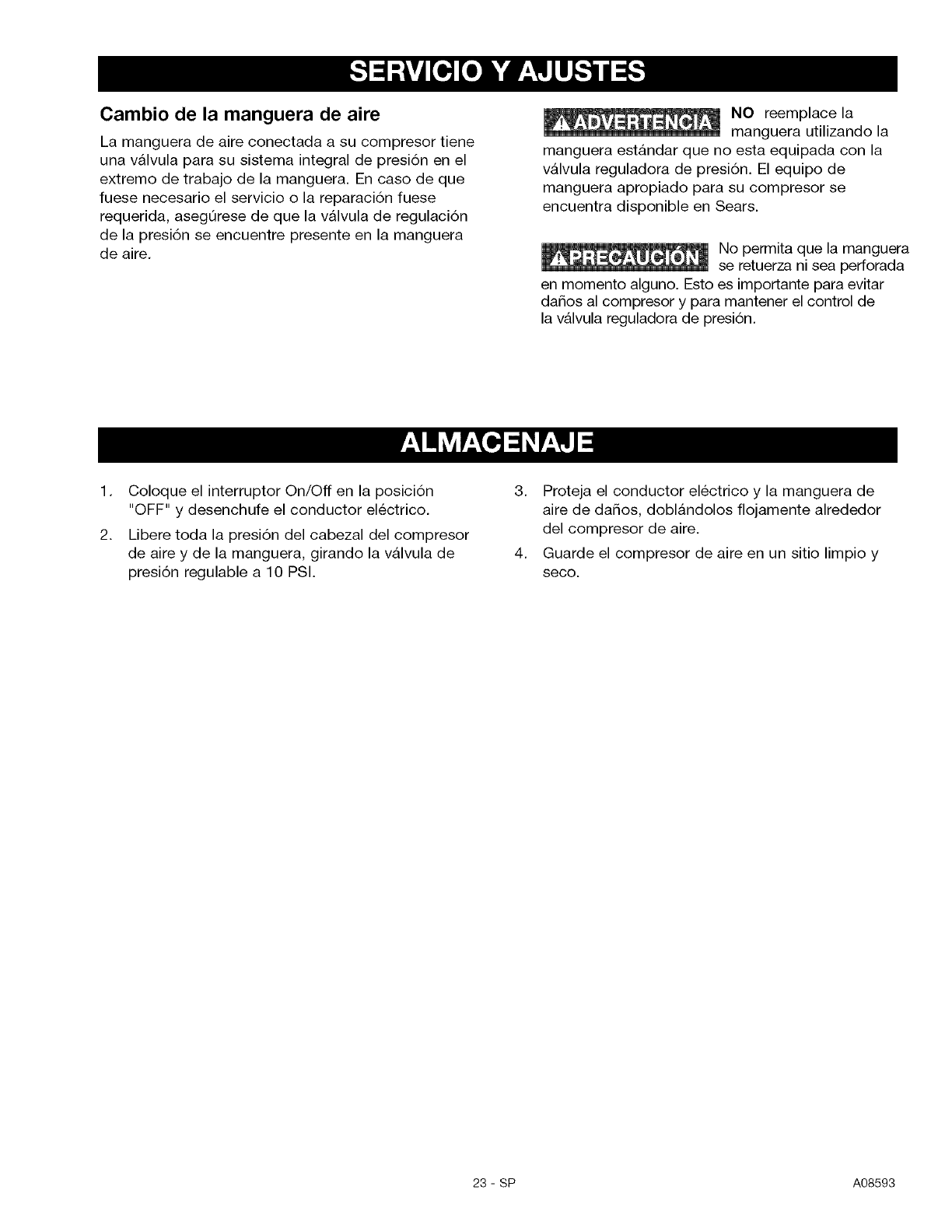
Cambio de la manguera de aire
La manguera de aire conectada a su compresor tiene
una v6.1vulapara su sistema integral de presi6n en el
extremo de trabajo de la manguera. En caso de que
fuese necesario el servicio o la reparaci6n fuese
requerida, asegQrese de que la v_.lvula de regulaci6n
de la presi6n se encuentre presente en la manguera
de aire.
NO reemplace la
manguera utilizando la
manguera est_.ndar que no esta equipada con la
v6.1vulareguladora de presi6n. El equipo de
manguera apropiado para su compresor se
encuentra disponible en Sears.
No permita que la manguera
se retuerza ni sea perforada
en momento alguno. Esto es importante para evitar
dafios al compresor y para mantener el control de
la v&lvula reguladora de presi6n.
1. Coloque el interruptor On/Off en la posici6n
"OFF" y desenchufe el conductor el@ctrico.
2. Libere toda la presi6n del cabezal del compresor
de aire y de la manguera, girando la v_.lvula de
presi6n regulable a 10 PSI.
3. Proteja el conductor el@ctrico y la manguera de
aire de dafios, dobl_.ndolos flojamente alrededor
del compresor de aire.
4. Guarde el compresor de aire en un sitio limpio y
seco.
23- SP A08593
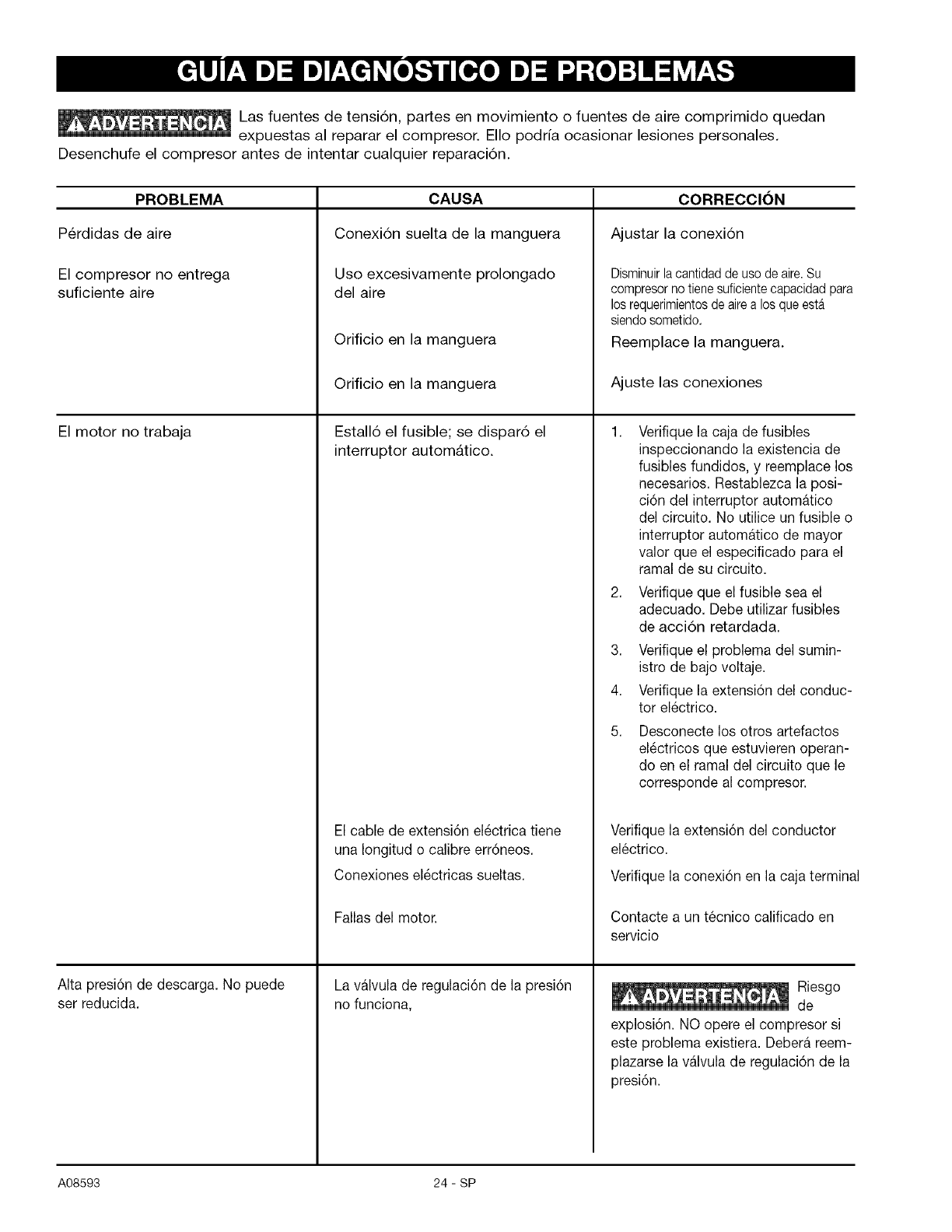
Las fuentes de tensi6n, partes en movimiento o fuentes de aire comprimido quedan
expuestas al reparar el compresor. EIIo podria ocasionar lesiones personales.
Desenchufe el compresor antes de intentar cualquier reparaci6n.
PROBLEMA
P6rdidas de aire
El compresor no entrega
suficiente aire
CAUSA
Conexi6n suelta de la manguera
Uso excesivamente prolongado
del aire
CORRECClON
Ajustar la conexi6n
Disminuirla cantidadde uso de aire. Su
compresornotiene suficiente capacidad para
los requerimientosdeaire a los que esta
siendo sometido.
El motor no trabaja
AIta presi6n de descarga. No puede
ser reducida.
Orificio en la manguera
Orificio en la manguera
Estall6 el fusible; se dispar6 el
interruptor autom_.tico.
El cable de extensi6n electrica tiene
una Iongitud o calibre err6neos.
Conexiones el6ctricas sueltas.
Fallas del motor.
La v_.lvulade regulaci6n de la presi6n
no funciona,
Reemplace la manguera.
Ajuste las conexiones
1.
2.
3.
4.
5.
Verifique la caja de fusibles
inspeccionando la existencia de
fusibles fundidos, y reemplace los
necesarios. Restablezca la posi-
ci6n del interruptor automa.tico
del circuito. No utilice un fusible o
interruptor automatico de mayor
valor que el especificado para el
ramal de su circuito.
Verifique que el fusible sea el
adecuado. Debe utilizar fusibles
de acci6n retardada.
Verifique el problema del sumin-
istro de bajo voltaje.
Verifique la extensidn del conduc-
tor el6ctrico.
Desconecte los otros artefactos
el_ctricos que estuvieren operan-
do en el ramal del circuito que le
corresponde al compresor.
Verifique la extensi6n del conductor
el6ctrico.
Verifique la conexi6n en la caja terminal
Contacte a un tecnico calificado en
servicio
Riesgo
de
explosi6n. NO opere el compresor si
este problema existiera. Debera reem-
plazarse la valvula de regulaci6n de la
presi6n.
A08593 24 - SP

25-SP A08593

A08593 26-SP

27-SP A08593
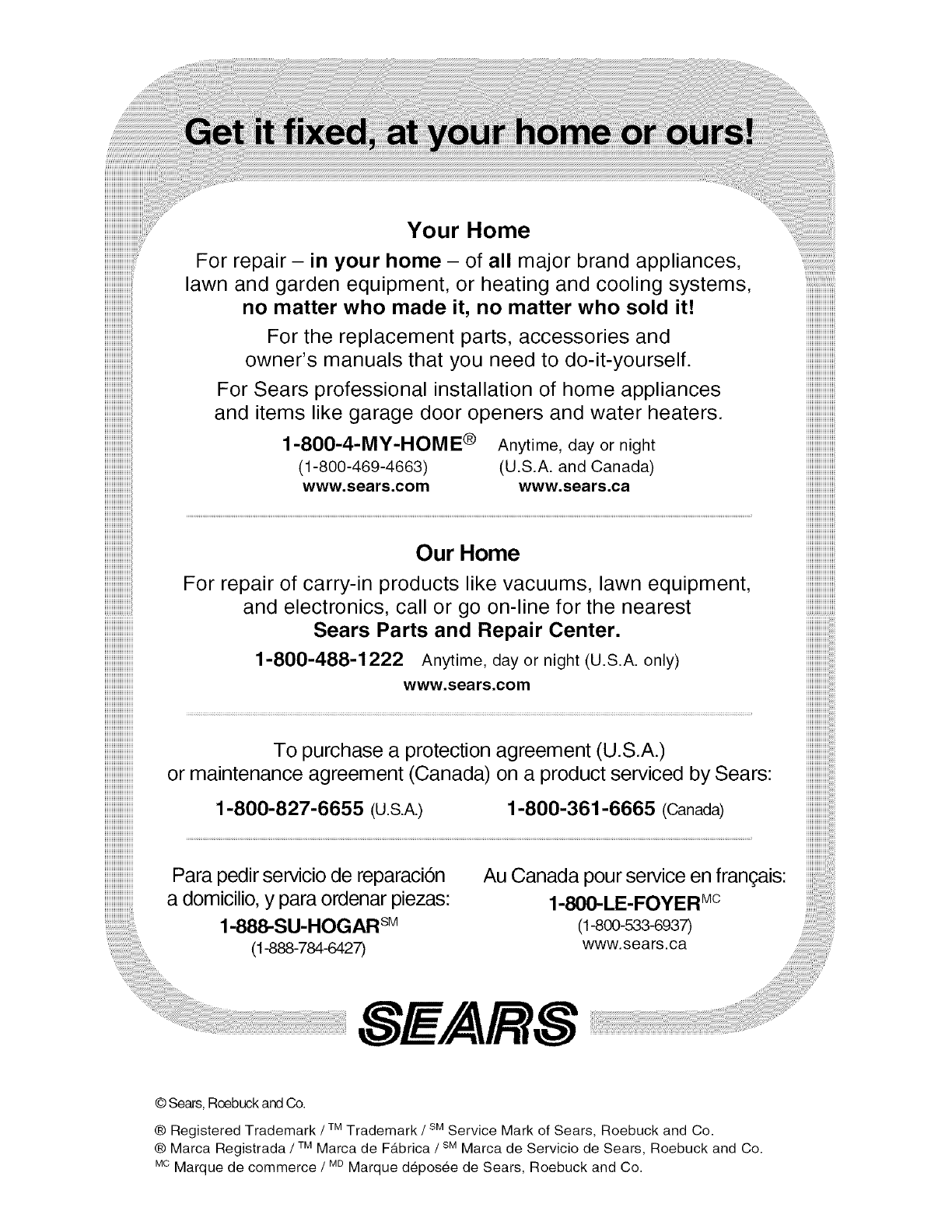
iiiiiiiiiiiiiiiiiiiii
iiiiiiiiiiiiiiiiiiii_
HHHHHHHHH
iiiiiiiiiiiiiiiiiiii_
iiiiiiiiiiiiiiiiii
iiiiiiiiiiiiiiiiii
iiiiiiiiiiiiiiiiii
iiiiiiiiiiiiiiiiii
iiiiiiiiiiiiiiiiii
iiiiiiiiiiiiiiiiii
iiiiiiiiiiiiiiiiii
iiiiiiiiiiiiiiiiii
iiiiiiiiiiiiiiiiii
iiiiiiiiiiiiiiiiii
iiiiiiiiiiiiiiiiii
iiiiiiiiiiiiiiiiii
iiiiiiiiiiiiiiiiii
iiiiiiiiiiiiiiiiii
iiiiiiiiiiiiiiiiii
iiiiiiiiiiiiiiiiii
iiiiiiiiiiiiiiiiii
iiiiiiiiiiiiiiiiii
iiiiiiiiiiiiiiiiii
iiiiiiiiiiiiiiiiii
iiiiiiiiiiiiiiiiii
iiiiiiiiiiiiiiiiii
iiiiiiiiiiiiiiiiii
iiiiiiiiiiiiiiiiii
iiiiiiiiiiiiiiiiii
iiiiiiiiiiiiiiiiii
iiiiiiiiiiiiiiiiii
iiiiiiiiiiiiiiiiii
iiiiiiiiiiiiiiiiii
iiiiiiiiiiiiiiiiii
iiiiiiiiiiiiiiiiii,,,
iiiiiiiiiiiiiiiiiiiii
iiiiiiiiiiiiiiiiiiiii
iiiiiiiiiiiiiiiiiiiii
iiiiiiiiiiiiiiiiiiiii
iiiiiiiiiiiiiiiiiiiii
iiiiiiiiiiiiiiiiiiiii
iiiiiiiiiiiiiiiiiiiii
iiiiiiiiiiiiiiiiiiiii
iiiiiiiiiiiiiiiiiiiii
iiiiiiiiiiiiiiiiiiiii
iiiiiiiiiiiiiiiiiiiii
iiiiiiiiiiiiiiiiiiiii
iiiiiiiiiiiiiiiiiiiii
iiiiiiiiiiiiiiiiiiiii
iiiiiiiiiiiiiiiiiiiii
iiiiiiiiiiiiiiiiiiiii
iiiiiiiiiiiiiiiiiiiii
iiiiiiiiiiiiiiiiiiiii
iiiiiiiiiiiiiiiiiiiii
iiiiiiiiiiiiiiiiiiiii
iiiiiiiiiiiiiiiiiiiii
iiiiiiiiiiiiiiiiiiiii
iiiiiiiiiiiiiiiiiiiii
iiiiiiiiiiiiiiiiiiiii
iiiiiiiiiiiiiiiiiiiii
iiiiiiiiiiiiiiiiiiiii
Your Home
For repair- in your home - of all major brand appliances,
lawn and garden equipment, or heating and cooling systems,
no matter who made it, no matter who sold it!
For the replacement parts, accessories and
owner's manuals that you need to do-it-yourself.
For Sears professional installation of home appliances
and items like garage door openers and water heaters.
1-800-4-MY-HOME ® Anytime, day or night
(1-800-469-4663) (U.S.A. and Canada)
www.sears.com www.sears.ca
Our Home
For repair of carry-in products like vacuums, lawn equipment,
and electronics, call or go on-line for the nearest
Sears Parts and Repair Center.
1-800-488-1222 Anytime, day or night (U.S.A. only)
www.sears.com
To purchase a protection agreement (U.S.A.)
or maintenance agreement (Canada) on a product serviced by Sears:
1-800-827-6655 (U.S.A.) 1-800-361-6665 (Canada)
Para pedir servicio de reparacion
a domicilio, y para ordenar piezas:
Au Canada pour service en fran(_ais:
1-800--LE-FOYER Mc
(1-800-533-6937)
www.sears.ca
6 AR,
© Sears, Roebuck and Co.
® Registered Trademark /TMTrademark /SMService Mark of Sears, Roebuck and Co.
® Marca Registrada /TMMarca de Fa.brica /SMMarca de Servicio de Sears, Roebuck and Co.
MCMarque de commerce /MDMarque depos6e de Sears, Roebuck and Co.